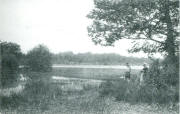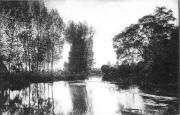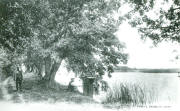
![]()
![]()
![]()
![]()
![]()
![]()
![]()
![]()
![]()
![]()
![]()
![]()
![]()
![]()
![]()
![]()
![]()
![]()
![]()
![]()
![]()
![]()
Larousse Accident Compost Pit Slap Sotton Old Woman Solange
Bigoudi GGauthier Twins Pen Infanticide
Conversation Unclear Casino Threshold Michel Bombay
About Laure Acknowledgements Autrefois Go-top
![]()
![]()
![]()
![]()
![]()
![]()
![]()
![]()
![]()
![]()
![]()
![]()
![]()
![]()
![]()
![]()
![]()
![]()
![]()
![]()
![]()
![]()
For proper viewing please use Firefox as your browser, so larger images will resize in frame.
Neither Microsoft Internet Explorer nor Google Chrome will automatically resize large images in frame.
Click on the images below to view large size. Use the back button on your browser when going between
a large size picture and this page, so you do not lose your place on this page.
Not long ago, not so far away, on the same planet, a man was judged by
the quality of his works; a woman, by the way she ran her household. No
one was unemployed. There was more work to do than there were hands to
do it.
In the town, there was electricity but no running water. Most
people had a garden behind their houses and, also, a small vineyard or
piece of a forest. Wood and coal were the only sources of energy. In the
village, people were craftsmen or shopkeepers.
In the surroundings, the people were farmers with a few cows and
pigs, hay and wheat fields. Some families were only tenant farmers or
sharecroppers. There was no electricity, running water or sewer systems
on the farms. They had a well, candles or kerosene lamps and went to bed
at night knowing what they had to do the next day to sell their
surpluses at the Friday market. Women made butter and cheese, clothes.
They wore women’s clogs around the farms and store-bought shoes on
Sundays to go to church, for weddings, dances and funerals.
There were many festivals with decorated chariots, parades and
dances. Those who lived in the village could go see a movie once a week
in the back of the largest café, where men also went to play cards and
drink the local rosé wine after the weekly market. There were also cafes
in the kitchen of many houses, such as the local barber and bakers.
Each craftsman belongs to a guild—the masons, the carpenters, the
wine-makers, those who worked metal (the farriers, the clock-makers) had
a guild responsible for a festival. The town had a municipal band of
volunteers who would play at each festival and give a concert in the
town hall once a year.
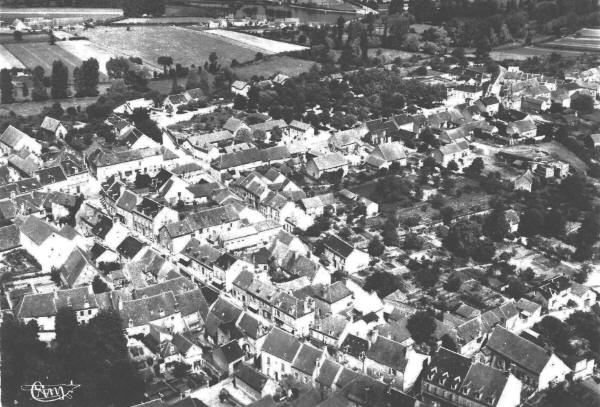
Chateaumeillant, Cher -- Berry, France circa 1950
For proper viewing please use Firefox as your browser, so larger images will resize in frame.
Neither Microsoft Internet Explorer nor Google Chrome will automatically resize large images in frame
Click on the image above and the images below to view large size. Use the back button on your browser when going between a large size picture and this page, so you do not lose your place on this page.
There were two times—BEFORE THE WAR TIMES and AFTER THE WAR TIMES—and
they were spoken of as such. BEFORE THE WAR meant the way our
forefathers had done. AFTER THE WAR meant the American way, i.e., the
mechanization of agriculture thanks to the Marshall Plan, tractors
instead of horses and oxen, harvesting machines instead of your
neighbors with scythes and cycles, flattening the landscape for large
machinery instead of planting hedgerows, barbed wire instead of
honeysuckle and blackberry hedges. Mechanization changed everything and
took command—cars, trucks, vans. everywhere—supermarkets competing with
farmers’ markets.
The rapid expansion of this non-indigenous transformation created
an immediate division between those who could afford it and those who
could not. Small farms disappeared, old trees were uprooted to flatten
the land for the easy movement of machines, country roads were paved.
The landscape itself was transformed; landmarks, iconic sites, spiritual
and historical anchors disappeared.
What happened DURING the war is under the regime of BEFORE. The
landscape has not changed. People have taken sides. Some support the
Vichy government—the merchants, the pious, rich farmers. The majority—
the workers, the poor farmers— support and are in the Resistance
(covertly, few overtly before 1943).
This small town had been a Roman stronghold known as
MEDIOLANUM—MIDDLE OF THE LAND. Now, how did the Romans know that? No
wonder we—the ones they called the HAIRY ONES—were impressed by
everything they did. How could one (200 years BC) measure a country? The
Romans did—and accurately. The present-day marker indicating the
geographic center of France is not very far away from Mediolanum—known
today as Chateaumeillant.
It is said that it was a Roman officer from Mediolanum, France
who founded MEDIOLANUM—MILANO—in what is now Italy, after his return to
his homeland.
The town has a small museum housing the artifacts found on the
site and the surrounding areas by farmers plowing or digging wells and
foundations. There is even the burial site (a tumulus) of a high-ranking
officer. It is not a pretty town—houses of grey stucco are stuck one
next to the other along one main street going North-South with a zigzag
in the middle. On a rainy day it looks dismal, sad, even ugly (like most
French towns of the 18th century). But if the visitor knows how to get
lost in the countryside, he will find the medieval—even Roman—vestiges
of its past, the charm of a shy and delicate Nature, the landscapes of
George Sand and the “Grand Meaulnes”, the swamps of AVARICUM, the
Cistercian Abbey, the habitat of the many legends, its history.
The town is on a hill, which allowed the Romans to overlook the
countryside around their camp. Tunnels dug below their camp lead to all
sides of the surrounding areas and were large enough to move men,
animals and equipment. The remnants of these tunnels still serve today
as cellars for the town inhabitants.
As in most villages and small towns in rural France before World
War II, there was no running water, no sewer systems. There was
electricity in the towns and villages but not in the hamlets. Farms were
situated near wells. so water had to be drawn one bucket at a time. No
plumbing systems, no bathrooms, no faucets anywhere, no sinks.
There were outhouses, always a distance from the farm, usually
past the wood pile so the users of the outhouse could bring back
firewood for the chimney, where cooking was done. Usually, there was a
brick and stone oven in one wall, fired once a week to make bread and
bake pies and other delicacies. Very few farms had wooden stoves to heat
the room besides the fireplace.
Most farms had only one room with a bed arranged against the
wall, a long table with long benches on each side. The beds, high off
the stone floor, were enclosed in tents of heavy flannel attached to the
ceiling from a large brass ring. Those curtains kept in the heat from
the bodies and gave a measure of privacy to the occupants. The cloth was
often red.
A family consisted of one or two grandparents, their son or
daughter, and the grandchildren and the farmhands, often a couple and
their children. The land was inherited or was leased to sharecroppers,
poor peasants who shared half the products of the farm with absentee
owners.
Women knew how to knit and sew clothes. Only men’s work clothes
were bought and they lasted a lifetime. Linen was a part of the woman’s
dowry and lasted more than a generation. They were often of hand-spun,
hand-woven cotton or linen. They were washed by boiling in large tubs or
a tripod placed on a fire outside in the courtyard, then taken in a
wheelbarrow when cooled to the nearest stream for beating with a paddle,
then rinsed in clear running water. Diapers, women’s sanitary napkins
were treated the same way. Once rinsed and wrung, the laundry was spread
on the hedgerows of honeysuckle or blackberry to dry.
There were two schools, one for boys and one for girls, that all
children had to attend until the age of fourteen. Farm children had to
walk miles each day to come to town on foot. Some stayed with relatives
or other families in town during school days. All children had an hour
and a half for lunch, since they often had to go fetch water at the
three pumps in town during their lunch break. The water was carried in
tall metal containers with one handle on the side, called brocs, that
carried about two gallons.
Only a few families in town had radios or wind-up gramophones.
There were only 5 telephones in the village: the post office was number
1, the gendarmerie was number 2, the two doctors were numbers 3 and 4,
and the veterinarian was number 5. Each hamlet had a telephone in the
café or small post office, from which you could call another post office
and tell the operator at what time you would be there to place a call to
another person. A boy on a bicycle would relay the message to an
isolated farm and the correspondent would ride on horse or bicycle to
the post office or telephone to be there at the appointed time.
When sick or in the need of a doctor, patients would just appear
at the doctor’s door or be brought in. Persons with chronic illnesses
would wait for Fridays to visit the doctor after the weekly market and
before going to the cafes.
There was one church and one cemetery. Bells would toll loudly
enough to inform everyone of funerals or weddings. Those who could
afford it paid women to go door-to-door to announce funerals and also
“weepers”—women who moaned loudly behind the coffin.
Communications from the town hall to the people about elections
and meetings were made via a drummer who went from neighborhood to
neighborhood, hamlet to hamlet, beating a roll from his drum to attract
attention and then reading the notices in a large voice. Since he had a
large area to cover on an old bicycle, it would often take several days
to deliver messages. He was rewarded with generous quantities of wine to
clear his throat after each reading and was obliged to sleep in ditches
or barns at the end of the day. Bigoudi was our town drummer and the
best-known alcoholic—of which there were many, since wine was easier to
get from a bottle than water from a pump or well. But he was part of our
landscape and accepted as such.

![]()
![]()
![]()
![]()
![]()
![]()
![]()
Larousse Accident Compost Pit Slap Sotton Old Woman Solange
Bigoudi GGauthier Twins Pen Infanticide
Conversation Unclear Casino Threshold Michel Bombay
About Laure Acknowledgements Autrefois Go-top
![]()
![]()
![]()
![]()
![]()
![]()
![]()
LAROUSSE
Chateaumeillant, Cher, France 1937-1945
When I asked Suzanne the difference between a village and a hamlet, she told me that the hamlet was smaller than a village and did not have a church. That answer disturbed me because Jean Sablon, popular crooner of the 20s, had been singing: “Il est une église, au fond d’un hameau, dont le fin clocher se mire dans l’eau, dans l’eau pure d’une riviere.” So, a hamlet could have a church. Or could it? It bothered me. Papa, who was really my grandfather but had brought me up with Grandma and Suzanne since I was eleven days old, was God. He therefore knew everything worth knowing.
So, I asked him the difference between a village and a hamlet. He
immediately pulled out Volume I of the 1929 Larousse Universel (the
latest) and spelling the word loudly several times read the tome’s
entry: German origin, related to the English “home”, a group of a few
rural houses not incorporated into a larger town. So, there you
were—church or no church. Larousse did not say. But Suzanne could not
say “no church.”
Grandpa took the opportunity to make me repeat the spelling over and
over again—H‑A‑M‑E‑A‑U. The rhythm suggested a tune that formed in my
head and I went back to Suzanne in the kitchen singing H‑A‑M‑E‑A‑U and
telling her, bragging about the meaning of the word according to the
highest authorities of the time, Papa and Larousse.
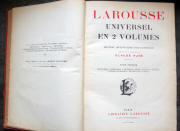
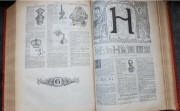
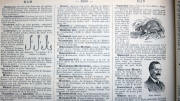
Growing up, Larousse was our entertainment. Although we had a radio, a
huge thing shaped like a gothic church, there were very few broadcasts
and it was only turned on for news. In the evening my sister and I would
look through the 2 tomes of illustrated Larousse, perusing through the
colored plates of animals, paintings, costumes and industrial
inventions. It made us dream of exotic places, things we did not know
but knew existed elsewhere.
Our grandfather, whom we called Papa, had gone to Madagascar
after the First World War to study tropical diseases, since many of our
soldiers had come from the then-French colonies. He had seen some of the
animals pictured in the Larousse and could vouch for their existence. We
even could see the photo of Grandpa and Grandma in Tananarive. Africa
was the most exotic place we knew of, and we invented games based on
what we knew of the continent. We even pretended that our toy dog was a
monkey and our small blue wooden elephant was roaming an equatorial
forest on the floor of our bedroom. We made a tent with our bed sheet
and chairs and called it our camp in the savannah. Oh, what a few
pictures in a Larousse can do!

![]()
![]()
![]()
![]()
![]()
![]()
![]()
![]()
![]()
![]()
![]()
![]()
![]()
![]()
![]()
Larousse Accident Compost Pit Slap Sotton Old Woman Solange
Bigoudi GGauthier Twins Pen Infanticide
Conversation Unclear Casino Threshold Michel Bombay
About Laure Acknowledgements Autrefois Go-top
![]()
![]()
![]()
![]()
![]()
![]()
![]()
![]()
![]()
![]()
![]()
![]()
![]()
![]()
![]()
Accident
Chateaumeillant, Cher, France 1937-1945
Although he lived a couple of days after his accident – in a coma – Monsieur Demenois did not survive the crash of his Rolls Royce in front of the castle in Culan. His chauffeur, Etienne Leblanc, did.
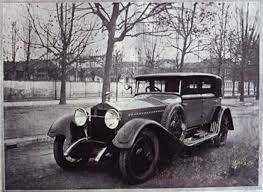
Other men had died there, in the deep ravine.
Nothing very unusual about that.
But a Rolls Royce had never been seen before.
So the car was what people talked about.
The beauty, the size, the comfort of the machine.
Even as a wreck it imposed awe.
The vases of cut glass inside, between each door, had not even
been broken. The white
roses had fallen out --the vases had remained affixed in their golden
loops. Something worth
talking about. Vases in a
car! The local inhabitants had heard of, or seen in magazines, Delages,
Talboots, Delahayes but an English car?
Never. As to
Monsieur Demenois, it was quickly learned
that he had been born in a small town south of Culan.
His mother had been
a servant in the small manor house of a local minor nobleman. The local
farmers called the place “the chateau” since it had a medieval tower on
one side and was surrounded by a large forest.
By local standards it was an imposing structure with slate roofs
and was impeccably maintained.
From the main road only the roofs and the top of the tower could
be seen. Yet a very
unassuming, private place as most of the manors in Berry were.
It had been assumed long ago that the child of Ninon Autissier had been
fathered by the viscount and no one thought more about it.
Philippe Autissier grew up as a small child in the “chateau,”
among several others belonging to the other servants and day laborers.
His mother continued her work there, mostly as a cleaning woman.
At age six Philippe was sent to boarding school in Chateauroux.
He was a tall boy for his age, good looking, intelligent and
disciplined. On holidays he
would come back to visit his mother and play with his childhood friends.
Although better dressed than his play-mates, he never flaunted
his advantages over the children of farmers or share-croppers.
He was very affectionate with his mother, although his unusual height,
like the viscount, gave him a natural air of aloofness – not
superiority. His mother, after all, was just a servant.
When Philippe reached his twelfth birthday the viscount sent him
to Paris to a boarding school where Latin and Greek were taught.
Philippe made a few trips from Paris to visit his mother before her
death when he was eighteen.
He was seen at the local cemetery where she was buried in a simple grave
with a small marble marker.
The Viscount died ten years later and the chateau abandoned.
After receiving his baccalaureate he was sent to Paris to continue his
studies. After that he was
never seen again in the region.
His mother Solange died sometime during the war and the property
was sold to a local farmer and is now the summer residence of an
Englishman.
From Etienne Leblanc we learned that Mr. Demenois was a very rich
industrialist, that he was a widower and that his destination was a
small hamlet near the town of Chateauroux.
News travels very quickly in small towns.
No need for newspapers, which few people read at that time and
were delivered by the local bus several days later after the fact.
Newspapers and magazines were dropped at the “papeterie”, the store
where one could buy small books, postcards, notebooks and other school
supplies as well as candies.
A small notice was printed the following week after Mr. Demenois’ death
mentioning that he had been born and raised in the small town of Culan,
which by that time everybody knew.
Two lines in the obituary section.
No one saw Philippe again until the chauffeur of the Rolls-Royce
revealed to the authorities – and therefore everybody – that Monsieur
Demenois was a rich industrialist who had made a fortune in steel and
that he was on his way to an isolated farm near the chateau of L.M.
Six months after the death of Philippe Demenois, a Parisian lawyer
arrived at the farm of Solangelette Autissier to inform her that she was
the legal and only heir to Mr. Demenois’ fortune.
It seems logical to assume that the twenty-seven year old farmer
must have been surprised – or had her mother, Solange Autissier or her
mother’s parents told her that her father was Philippe Demenois?
We do not know.
Solange Autissier had been seventeen when she met and fell in love with
Phillippe Demenois at the local fair.
Solange was a very pretty girl and a very good, natural dancer.
Solange is a very common name in Berry.
It is the name of a saint.
History or legend, one or the other depending on your faith, says
that such a person existed.
Her mother and grandparents had died by that time and she was running
the small farm she had inherited with the help of a retired – because of
injury to a leg – mailman living in a nearby hamlet.
They intended to be married once the harvest was done.
He was older than she was but was a good, simple man, reliable
and of clean habits. They
intended to stay in the small, one-room farm with its stable, hay
barn and outdoor well and outhouse.
His chauffeur, Etienne Leblanc, received several fractures and a
concussion. He remained
many weeks in the hospital in St. Amand and it is from him that we
learned the story.
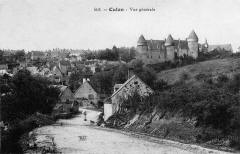
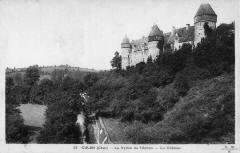
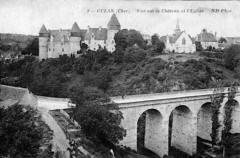
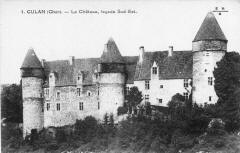
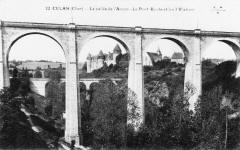
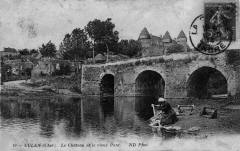

![]()
![]()
![]()
![]()
![]()
![]()
![]()
![]()
![]()
![]()
![]()
![]()
![]()
![]()
![]()

Larousse Accident Compost Pit Slap Sotton Old Woman Solange
Bigoudi GGauthier Twins Pen Infanticide
Conversation Unclear Casino Threshold Michel Bombay
About Laure Acknowledgements Autrefois Go-top
![]()
![]()
![]()
![]()
![]()
![]()
![]()
![]()
![]()
![]()
![]()
![]()
![]()
![]()
![]()

The Compost Pit
Chateaumeillant, Cher, France 1937-1945
It was the year of the “Débacle”.
The Maginot Line, thought impregnable, had not been breached. It
had been bypassed.
The German Army had
simply gone around it and was coming from the North. First, we saw
French officers in cars driving south, then the foot soldiers, those who
had gone to war with flowers in their guns to fight the war to end all
wars, singing “Y’a Hitler sur la ligne Maginot.” Now, the French army
was walking it did not know where, heads down, eyes vacant, hungry,
dirty, stinking, dragging itself like mangy dogs, begging for food and
water, hugging walls in case of enemy air-attacks.
We watched, as stunned as they were.
Our courtyard was full of soldiers, washing at our water pump,
eating all of Grandma’s canned fruit and vegetables brought up from the
cellar.
All the yards were full of the remnants of an army. When they
moved on, on orders given by someone, they would be replaced by more of
the same. For many days, on and on went this disorganized parade of
shuffling, creeping, wounded men, called “La Déroute”.
One day, as I was taking food in a small metal pail from my
grandparents’ house to my Great-Grandmother’s for her dog—just stale
bread soaked in the hot water we poured over the plates before washing
them, just to give the bread a little taste—it was snatched from my
hands by a hungry soldier. I kept saying, “But it’s for the dog!” and
the soldier had replied, “But I’m hungry too.” I was shocked—shaken and
deep down humiliated by the sight of a man gulping down dog soup without
a spoon.
Then, one day, the “defile” stopped. There were no more men.
Where did all these poor men go?
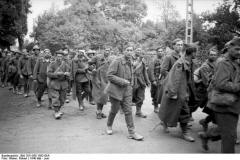
The larger town—where I had been in boarding school, since our village
only had a primary school—had been bombed, so I had been brought back to
attend the small girls’ school and given additional tutors for subjects
not taught there. The village—small town, just under 1900
inhabitants—also had a boys’ school at the other end of town. Some of
the children came to school every day from isolated farms or hamlets
after a one- or two-hour walk, most in wooden clogs without socks. In
wintertime, some put straw in their clogs to keep warm and carried a hot
brick wrapped in a towel against their chests. Lucky ones had heavy
hand-knit socks, caps, and mittens.
We did not look down on the poorly dressed and shod children who
sat next to us town children because there was some sort of awe in front
of their unstated stamina, dogged perseverance, the straightforward
demand for equal treatment in their eyes. They did every day a task we
could not imagine, we town softies. Besides, some of them had shown to
be our intelligence equals. Some of these children really smelled very
badly of cow manure and other potent odors, but we accepted that, along
the smell of chalk and ink permeating the classrooms. Even dirty
children do not smell as bad as unwashed adults. Children do not
perspire as much, I guess. Or because they do not drink wine as much as
grownups. We did drink a little wine with our meals, and, in wintertime,
coming home from school half frozen, we were given a big bowl of half
wine-half water, warm, with sugar and spices. That did not prevent the
chilblains that we had on knuckles and knees, but it warmed your
chest—the most important part of the body, we knew—for a few hours,
enough time to do your homework. War or no war, heat in the house or
not, enough food or not, enough light or not, there was always homework
and wine. Wine was more common and plentiful than food: everyone knew
how to make it, and the vineyards always produced more or less grapes,
but always enough.
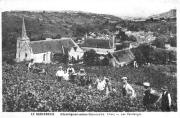
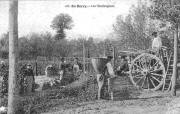
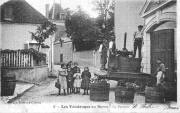
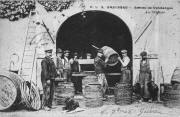
There was to be a math test. I did not like math, pretty close to
hated it. I was not good at it. It was too dry for my taste, and you had
to write down all the theorems learned by rote in the left hand margin
of your geometry problems. Even one word left out was counted as a
mistake.
So, I had to think of a way to avoid taking the test and came up
with the idea of breaking a leg. Grandpa, the doctor, would have to put
my leg in a cast and probably make me rest a few days in bed, as he did
recommend with broken limbs. If I did not manage to break a leg, I might
break an arm—the right one, preferably, since I was right-handed—or had
been made to be, since left-handedness was not acceptable then.
No problem. We had, in a corner of the garden, a large compost
pit. It was made of cement, about eight feet long and five feet wide. In
it, Eugene, the gardener and my grandfather’s orderly since the First
World War, threw the manure from our chicken coop and rabbit hutches, as
well as all the debris from the garden and the kitchen.
I
conceived the idea of jumping from one end of the compost wall to the
other. I was very agile, but this was a long leap to make and surely I
would hit the opposite wall with one part of my body or another. Before
going to school, the day of the exam, I went to the garden, sure of
determination and guarantee of success, and after pumping my legs as
before a sprint, leaped off the cement wall.
I did hit the wall—a little—but only with my forehead and fell
inside the warm composted manure. I must have screamed, unbeknownst to
me, because Eugene and his wife Suzanne, who helped Grandma with the
housework, came running and yelling, “Look what she has done now!”
I was carried into the house, washed, re-clothed, and brought to
my grandfather’s surgery room where, without a word, my forehead was
painted with a burning iodine, then bandaged. By now, I had a bump the
size of half a grapefruit but no broken bones.
I was ashamed, embarrassed by my stupidity, and worried about
what would happen next.
With his pale blue eyes burning into mine, Grandpa just said, “No
harm done. Don’t you have an exam today, young lady?”
And that was that. Feeling defeated, like those soldiers in “déroute”, I went to school with a pain in my head, a bandage on my forehead, and my pride, situated somewhere in my mid-section, churning.

![]()
![]()
![]()
![]()
![]()
![]()
![]()
![]()
![]()
![]()
![]()
![]()
![]()
![]()
![]()
![]()
![]()
![]()
![]()
![]()

Larousse Accident Compost Pit Slap Sotton Old Woman Solange
Bigoudi GGauthier Twins Pen Infanticide
Conversation Unclear Casino Threshold Michel Bombay
About Laure Acknowledgements Autrefois Go-top
![]()
![]()
![]()
![]()
![]()
![]()
![]()
![]()
![]()
![]()
![]()
![]()
![]()
![]()
![]()
![]()
![]()
![]()
![]()
![]()

The Slap
Chateaumeillant, Cher, France 1937-1945
It was the summer of ’41. The town where I was in boarding school (I had
been in boarding school since the age of 6) had been bombed, so I had
returned to my grandparents’ village. My grandfather had found
tutors—Monsieur Fradet for Latin and Mlle Perronet for English and
French.
I now know that Mlle Perronet, a retired grammar school teacher,
did not know English well, but I liked going to her house, which she
shared with another retired teacher, Mlle Fusibet. I had heard
deprecating rumors about these women and had told Grandpa, who had
replied that these ladies were honorable and their lifestyle was
nobody’s business. Mlle Perronet could play the piano (a little) and
managed to teach me “Ba Ba Black Sheep” and “Oranges and Lemons” over
the course of the summer. Mlle Fusibet tended the large garden where
we would often walk, dictionary
in hand, to learn the English names of plants. But we never made a
sentence with them, so I always forgot them.
Monsieur Fradet lived on the outskirts of the village at the top
of a very steep hill. His house was surrounded by his small vineyard,
kept in weedless condition. He taught me Latin, gave me lessons, and
made me recite my verbs and declinations.
I did not like going to Monsieur Fradet’s house. The hill was so
steep I had to dismount my bicycle before reaching the top, out of
breath—bicycles had only one gear then. My lessons were in mid-afternoon
when the heat was at its worst.
That afternoon I had gone to a small meadow on the outskirts
where we kept Ponette, the horse that drew my grandfather’s buggy, since
there was no gasoline for his car. I knew daisies grew in the ditch by
the hedgerow. Also, honeysuckle and blackberries.
No one in town had a wristwatch. A few men, like my grandfather,
had pocket watches at the end of chains tied to the buttonhole of their
vests and kept in a pocket. But the town hall had a very big clock that
struck the hours, the quarters, and the halves. It could be heard
everywhere. And I heard it strike three. Time to go back home, mount my
bicycle, and go to my lesson. But I was having such a good time and was
carrying an armload of daisies. And it was cool in the ditch.
The idea occurred to me to pretend that I did not hear the clock.
Grandpa was rarely home during the day, going on his errands to take
care of his patients and returning only at the end of the day for
dinner.
I stayed in the meadow and returned only around four for the “gouter”,
the four o’clock snack. The front door was, in fact, two, joined by a
large metal bar with a sculpted knob in the middle. When both sides were
opened you could bring in a stretcher. I came in with my flowers only to
see Grandpa coming toward me in the corridor.
“Where have you been? Don’t you have a lesson with Monsieur
Fradet? Don’t you know the time?”
“No,” I said.
Instinctively, I backed up against the door, guilt rising from my
feet, paralyzing me on the spot where my back touched the door and the
left side of my head touched the metal doorknob. I could easily see that
Grandpa was furious. His voice was angry, loud, uncontrolled. It was so
I was carried, dragged, escorted by the two women and made to sit
on a stool next to the operating table. The wound was cleaned and
dressed, no stitches. And I now had a bandage around my head.
After all the necessary was done, Grandpa said: “Now go to Mr.
Fradet and apologize.”
I was speechless. My head throbbed. It was still hot, and I was
not thinking of the fact that I would miss my gouter too, but I dare not
disobey Grandpa.
Angry, ashamed, hurt, Grandpa, Grandma, Suzanne watching me, I
mounted my bicycle, left the house and rode in the direction of Mr.
Fradet’s house, up that stiff hill.
I was stunned. Stunned by the depth and ferocity of Grandpa’s
anger. “Why? Why?” I kept asking myself. Sure, I had lied. I knew the
time, had heard the clock. But he had never slapped me before on the
face. Occasionally, Grandpa had hit me on the buttocks, but usually I
was given a lecture, his eyes piercing me like lances, and that was all.
Like the time I had been caught by Eugene trying to drag a ladder
from the garage to get to the roof after having seen a picture of a
parachute. The intention had been to put the ladder against the wall of
the woodshed, climb up with an umbrella, and jump down with the umbrella
opened. All the ladders were made of wood then and were very heavy, so I
had not gone very far when Eugene, grandpa’s orderly/aide/gardener and
Suzanne’s husband, met me and asked me what I thought I was doing. Proud
of myself and my knowledge, I told him my intentions, and, of course, he
in turn told Grandpa. That fostered a long lesson on gravity, the speed
of falling objects, the distances needed to brake the fall as in a car,
a bicycle, etc…etc…and a spanking on the buttocks to add weight to the
discussion lest I forget.
Eugene and his wife Suzanne had the right to discipline me
whenever they felt I needed it. Which was quite often. I was very
mischievous, although I thought at the time “adventurous” a better
description of myself.
They kept a cat-o’-nine-tails whip in the kitchen where one or
the other could find it most of the time. The whip had a wooden handle
and a dozen or so, maybe nine, long leather straps, about an inch wide.
It was kept on top of the hutch, so I could not reach it even if
I stood on a chair (I had tried). It stung when it hit your calves, but
Eugene or Suzanne never hit very hard, although it left marks on your
skin for a couple of days. Of course, in those days girls never, never
wore pants, even when there was a foot of snow on the ground. Pants on
women led to lewd behavior, smoking, driving cars, and inevitably to
immoral conduct (meaning fornication outside of wedlock). It seemed that
every sin led to fornication, the ultimate, unforgiveable offense with
the worst consequences now and in the thereafter.
I made it up the hill and arrived at Mr. Fradet’s house to find
him in his vineyard, a copper sprayer strapped to his back. He saw me
and my bandage and asked what happened. Was I going to tell him that I
had gotten the beating of my life for having tried to avoid coming to my
lesson? No, no, no. So, I lied again and answered that I had fallen off
my bike, all the time trying to imagine whether Grandpa could possibly
know what I had just said.
Mr. Fradet then told me that it was too late for my lesson, that
he had to continue what he was doing because the sprayer tank was almost
full and he had to finish it lest it thicken and clog the sprayer line.
I should go home and enjoy myself.
I was furious. I could feel my veins engorged with blood. The
pain in my head was knocking so hard behind my eyeballs that my pupils
were out of focus. Now I knew what “seeing red” was. I had gone to all
this trouble, pain, effort to get here, and the old man did not even
care. I had been made to feel guilty for nothing. That was not fair.
That was not just. That was not human. That was not...
Coming back down the hill, coasting, had always been a pleasure.
The air in your hair made you feel (a little bit) like those aviators
who did tricks with their machines at the air-show in Chateauroux, the
big town 46 km away. Or you could soar like the geese that flew twice a
year above the town on their migrations to far away countries, even
continents, across the Mediterranean Sea to Africa. The thought, as well
as the physical contact with rushing air, gave you goose pimples.
Cleared the acid juices out of your stomach and tangled wiring in your
brain.
Why had Grandpa done this? He was not an impulsive, violent man.
As I was free-falling down Main St., known as the Grande Rue, the
only “rue” in fact, I began to put the elements of my misfortune
together:
First—Your word is your word. You say you are going to do
something? You do it.
Second—You do not lie to Grandpa. He knows when you are
lying, as when you said you did not know what time it was.
Third—Mr. Fradet is as old as Grandpa. You respect your
elders, no matter what. If an elder expects you, you go. He may also
need the money he receives for teaching you.
Fourth—I have the same name as Grandpa. The family’s name,
honor, reputation, were at stake. Can’t sully that.
I was rearranging, analyzing the arguments, asking questions and
giving answers as Grandpa had taught me to do, riding full speed back
towards home. Before I entered the courtyard, I had my answers. Grandma
greeted me with a tall, cool glass of lemonade and an aspirin. I knew
that I was already forgiven. The lesson, however, still echoes 80 years
later.

![]()
![]()
![]()
![]()
![]()
![]()
![]()
![]()
![]()
![]()
![]()
![]()
![]()
![]()
![]()
![]()
![]()
![]()
![]()
![]()
![]()
![]()
![]()
![]()
![]()
![]()
![]()
![]()
![]()
![]()
![]()
![]()
![]()
![]()
Larousse Accident Compost Pit Slap Sotton Old Woman Solange
Bigoudi GGauthier Twins Pen Infanticide
Conversation Unclear Casino Threshold Michel Bombay
About Laure Acknowledgements Autrefois Go-top
![]()
![]()
![]()
![]()
![]()
![]()
![]()
![]()
![]()
![]()
![]()
![]()
![]()
![]()
![]()
![]()
![]()
![]()
![]()
![]()
![]()
![]()
![]()
![]()
![]()
![]()
![]()
![]()
![]()
![]()
![]()
![]()
![]()
![]()
Mr. Sotton
Chateaumeillant, Cher, France 1937-1945
I do not know whether I could find the way to Mr. Sotton's house in the
forest. I had never gone there by myself. I was a child then. But I
would like to think that if someone pointed me in the right direction I
would find my way. The way birds do. First the small dirt road, on the
right it was, in the middle of the forest. Then perhaps a mile farther
in, with ditches on both sides, the uneven ground, you suddenly came to
a clearing. And there it was on the right, in the center of the open
space. A square house made of stone with two steps in front. Inside,
just one room. A chimney, a table and two benches, a bed, an armoire.
Just one room, almost square, with only two windows, one on each side of
the door.
There was no electricity, no running water;
the well was outside in front of the house. On the left side of the
clearing was a large barn, larger than the house, with a stable for a
horse and a wagon. To the left of the door to the house was a small
plank supported by rough wooden legs on which stood a basin, pitcher,
and a cake of soap. On the wall had been nailed a broken piece of
mirror. This is where Monsieur Sotton washed and shaved. Although he had
a thick grey moustache, the rest of his face was clean shaven.
And that is where I saw a man shave
himself for the first time. A man without a shirt, with suspenders
dangling to his sides.
My grandfather used to be shaved twice a week by the village
barber, who would come to the house and use a folding, long-blade razor
that would be kept sharp by rubbing on a long leather strap attached to
a chair. My grandfather's shirt would be covered by a large towel, and a
round china basin with an indentation for the neck on one side would be
placed under his chin, to receive soap and water.
Not so with Mr. Sotton. After soaping his face, he used a
small-handled razor that he himself ran up and down his cheeks and neck.
When finished, he simply splashed more water on his face, then threw the
soapy water on the ground.
I was spellbound and fascinated and realized that the whole
experience, due to the simplicity of the house and to the act of shaving
alone, outside, in the middle of the forest, bare to the waist, was
something more natural, more elemental than the same function performed
in a bourgeois household such as ours. We had many rooms in our house:
living room/dining-room,
kitchen, offices, waiting room for my grandfather's patients, bedrooms,
bathrooms, corridors, inside stairs, and balconies and, outside, garage
and sheds.
Here, at Mr. Sotton's, everything was compact, reduced,
distilled, minimalized. It was not a house but a refuge against the
elements. Its solidity exuded safety, tranquility. And then it occurred
to me that Mr. Sotton's house was like his torso—strong, square,
straight, not lean yet with no extra fat, and of a color acquired by
outdoor work, often in the sun without shirt. The house may not have
been comfortable by town standards, but it made you feel comfortable, at
ease.
The space told you, "faites comme chez vous".
There were no restrictions here, nothing to watch out for as in
the houses of the village ladies my grandmother went to visit. In those
houses, I had to stay still in my chair while the two women chatted
about things I did not understand or was not interested in. I was warned
in advance to watch where I put my feet (not on the chair rungs), not to
touch anything, and not to squirm in my seat.
My eyes would occupy the time looking at the objects on the mantelpiece
--the clock, the shells from First World War cannons, the photograph of
a deceased man in uniform. Mme Garnier husband?
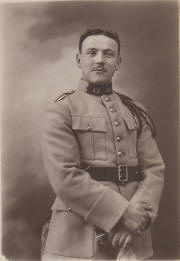
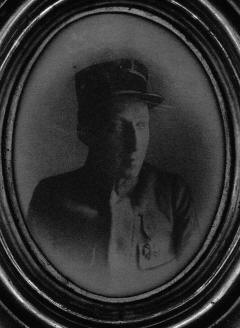
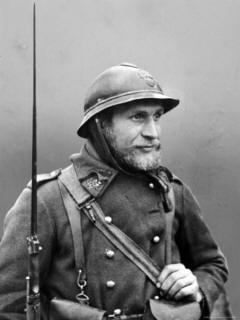
I had never been told whether she had been married. She had always
looked like a widow to me. But why have shell casings on the
mantelpiece? They were not pretty objects. They must be
souvenirs, I thought then - souvenirs to remember the war. People
were always talking about the war -veterans like my grandfather were
everywhere. The "Great War" they called it and yet my grandfather always
talked about the horrors of it. The mud in the trenches, the
stench, the lice, the lack of medicine, the horrible wounds from shells.
A souvenir? A reminder of some event, someone?
Sometimes, if I were lucky, there would be a painting or a reproduction
of one, a seascape, a landscape, something to get lost in until the
visit was over.
At the house of Mme Gamier, I was
given a cherry with stem marinated in
alcohol with sugar in a pretty little
glass. I enjoyed that but at other houses was bored. Here at Monsieur
Sotton's, there was no boredom possible. There was too much to be seen,
heard, smelled. The comfort was
overwhelming, like being wrapped in
a big comforter. No pretense—it was just itself. You did not have to say
"May I?" before sitting down. You just did what the others did: swing
one leg over the bench, then the other.
And there you were with your elbows on the
table, something you would never do at home. And it felt good.
His house looked like him and he
looked
like his house. They suited each other, were an extension of each other.
When Mr. Sotton had finished shaving, he slipped his suspenders
back on his shoulders and we all went in to have a glass of wine,
mine mixed with water. We sat on the benches on each side of a long
rough-hewn table, Mr. Sotton, my father and me, and the friend who had
driven us there in a car. My father made the arrangements with Mr.
Sotton for the use of his barn, where my father, a painter, wanted to do
some large paintings. A small bed would be installed in a comer of the
barn, next to the horse stall for warmth. That was all.
My father would share Mr. Sotton's food.
Mr. Sotton was the forest keeper, the warden. His responsibilities
were to keep the forest healthy and keep away poachers, clear dead trees
and maintain the road.
He was allowed to kill all the game he could eat,
gather all the mushrooms and plants he needed, and sell the cut dead
wood.
After my mother's death when
I
was six, my father had felt the need to isolate himself to heal his
pain. My grandfather had known Mr. Sotton and his wife before he became
a widower. My grandfather had attended Mme Sotton in her terminal
illness and knew of the peaceful existence of the forest keeper, his
gentle straightforwardness.
My father spent several springs and summers there, visibly
healing his mind and body.
My grandfather and
I,
who lived half an hour away, would often go to visit. Mr. Sotton had a
cocker spaniel by the name of Tarant, which is the first word,
the rallying call, before the hunt. The dog was as gentle as his master
and it was a pleasure to play with
him.
There was also an owl, without a name,
that
stood perched on a small gate closing the path to a pond. The bird just
stood there, waiting for Mr. Sotton to bring bits of meat. I was
fascinated by the way it moved its head from side to side, pivoting half
a turn on its neck.
Although its eyes were enormous, I was told
that it could not see well in the daytime.
It
also had a strange smell, not pleasant. It was free to roam at night but
simply chose to spend its day there on the gate, waiting for Monsieur
Sotton' s offerings.
On May Day, the holiday honoring working people, the custom was
to go in the forests to gather lilies of the valley, in bloom at that
time.
It
was an outing of mostly young people, the lily of the valley being
associated with courtship. Girls and young women went in groups.
Anything else would have been regarded as too "forward", unbecoming.
Young men also went in groups.
It
was an occasion to meet par hasard, to check each other out. An
occasion to say next time one met, "Oh I saw you in the forest, remember
me?"
For days afterwards, the schoolteachers' desks would hold many
bouquets of lily of the valley in glass jars, and the room traded its
usual smell of chalk, erasers and needing-to-be-washed
clothes for the sweet smell of the little white bells. Enough to make
you dream of the forest and the people you had seen there.
Some especially.
Then, it was already a place young people wanted to run away from. Dull,
boring, nothing changed in two hundred years. Nothing to do in spare
time. But it was a place where older people who had gone to live in
cities wanted to return to. For the peace and quiet, the soft look of
its rounded hills, its small hamlets, unchanged in two hundred years.
For the young, there was no sense of privacy. Everyone knew
everyone else, what they did—or were supposed to be doing—where
and at what time. Any change in schedules or places was immediately
noted and broadcast. "Where do you think she could have been going at
this hour?", one neighbor would ask another. The question would make the
rounds of the small town until a logical, plausible answer was found.
And if not? Well, young people will be young people. Remember? And you
wondered who she was going to meet at this hour and where.
Where
was often the banks of the lake-pond-swamp,
called the hang because it did not run all year.
It
was a very large pond formed by the damming of a swamp. On the dam
passed a road. One side of the road, opposite the pond, was much lower
than the water side, and a small house of stone had been built there for
the man who controlled the metal gates and sluice that maintained the
water level. Farmers would back up their
oxen driven carts into the pond to fill barrels with water to irrigate
their fields.
One could walk around half the pond and lie in the grass under
huge poplars. The opposite half was lined by a dozen small houses. But
one could also walk toward the water source, about a mile, and find
oneself on a narrow path with the waters clogged by water lilies and
reeds on one side and high hedgerows of blackberry and honeysuckle on
the other.
Once in a while,
there would be a man fishing but only in the deeper part of the lake and
there was no reason to go up a path that led nowhere.
Unless-of
course, you would have been the one embarrassed if you had gone there to
spy. Therefore, it was a logical place for lovers to go—a safe place,
since one couple was not likely to report on another.
Still,
it would have been nice to have a private life, to have been able to go
unnoticed anywhere, to wear clothes of one's choice, to fix one's hair
as one pleased, to know that there were more movies than once a week—in
proper theatres, too—not in the back room of a cafe, full of smoke, with
an old projector that broke the film several times
each time it was used, and where you had to go accompanied by a parent
or another adult the way you did when there was a dance, in the same
cafe, in the same room that had been transformed into a dance floor by
making wax shavings from an old candle to make it slippery.
There was a fee to be paid to enter the dance, since it had a
live orchestra. An accordion, a drummer, and a saxophone usually made up
the band that played polkas, waltzes and passo-dobles (a form of
simplified tango), sometimes a fox-trot.
There were no windows
in that back room, only a door that was kept opened for the heat that
quickly became intense.
The smell of body heat, added to the odor
of clothing impregnated with the scents of cows,
milk, hay,
tobacco, was as intoxicating as the
sweating hand of your dancing partner on your back.
Marie-Rose and I watched through the open door, fascinated,
studying the dancers' steps and moves. We were quite conscious of our
peeping, of our emotions. Peeping, like eavesdropping, was strictly
taboo, but peering into a public place was tolerated (after all the door
was opened),
provided that you did not stay too long. Time and place was everything,
and they always came together in acceptable or objectionable fashion.
Here, at the door of the cafe,
glaring, probably with our mouths opened, it was like looking at that
Japanese fan my grandfather had bought for my grandmother on one of his
trips to Bourges, the largest town in Berry.
On the fan, an artist had painted the scene of people having tea, seen
through the clouds of cherry trees in bloom. The eye would penetrate the
branches to partially—only partially—reveal what the persons in the
bungalow were doing.
There was mystery there, the fascination of discovery. On the dance
floor, it was to discover what kind of shoes the dancers were wearing,
what kind of clothes. Slowly putting together the elements of what
looked like pleasure. Adding up the pieces of the puzzle that
constituted that desirable picture of dancing couples.
When I was finally allowed to go in at age fifteen (with my
grandmother on a bench on the sidelines), my early impression of
Paradise was confirmed. Since I was a good dancer, I rarely had a rest
and my grandmother enjoyed herself, too, watching me dancing correctly,
the way she had taught me in the kitchen since I was five years old,
standing on her feet, holding her by her arms, lowered, while she sang
some tune from 1900.
Young men and women who did not need chaperones would often
disappear from the dance floor, and everyone would know what it meant,
talk about it, assess the prospects of a lasting relationship, point to
the good and bad points of each partner, agree, disagree on imagined
possible future developments. Most people did not have time to read
books or newspapers. We were our own tabloids.
After the war, running water and sewers were installed in the
whole town and its nearest farms. Many older people who had gone, years
before, to work in larger cities, returned. They bought old houses and
remodeled them, installing "modern" kitchens and bathrooms. At the same
time, automobiles appeared. Every house had a car, every farm a truck,
tractor, machines to separate the cream from the milk,
butane stoves. Farming methods changed.
Hedgerows were removed, old trees were uprooted, land flattened to
enlarge fields and make it smooth for tractors and harvesters, ancient
stone houses destroyed.
Some places do remain the way they were two hundred years ago.
They are known to those who were born earlier or lived in the area.
Others have become tourist attractions, beautiful places to visit-under
supervision—with large parking lots for buses and cars, sometimes with
hotels and inns
nearby.
Monsieur Sotton has been dead for more than half a century, but I
have been told that his house is still there in that clearing in the
forest. Someone probably lives
there today.
But I will not disturb the new occupants, nor will I
try
to peek, even if I could find the way.
The memory of the place, the man who lived there more than
seventy years ago, must remain safe.

![]()
![]()
![]()
![]()
![]()
![]()
![]()
![]()
![]()
![]()
![]()
Larousse Accident Compost Pit Slap Sotton Old Woman Solange
Bigoudi GGauthier Twins Pen Infanticide
Conversation Unclear Casino Threshold Michel Bombay
About Laure Acknowledgements Autrefois Go-top
![]()
![]()
![]()
![]()
![]()
![]()
![]()
![]()
![]()
![]()
![]()
The Old Woman and a Goat
Chateaumeillant, Cher, France 1937-1945
When I was a child and asked what I wanted to be when I grew up, I would
reply, “An old woman with a goat”. Everyone thought that to be a
sensible answer.
In Berry before WW II, there were many old women who knitted
woolen socks for sale. They were often seen sitting in ditches while
their goat, tethered to their leg by a rope, browsed in the hedgerows of
blackberries and honeysuckle. That way the hedgerows were trimmed and
the goats fed. One woman, Madame Chirade, was the one who sold my family
our winter socks, and we knew her well. Madame Chirade would come to our
house to take our measurements once a year. She carried no tape or other
instrument. Instead, she used a string with a knot at one end and
wrapped it around our closed fist. Apparently, the circumference of a
fist is equal to the length of the owner’s foot. She would make another
knot where the two ends of the string enclosed our fists. That was all,
but it fascinated me, and that was part of the reason why I wanted to
grow up to do that. But the other reason, the main one, no doubt, was
the goat. I loved goats and dogs. There are lots of goats in Berry.
Their milk makes many cheeses famous. Valencay, Crotins de Chavignolles,
and hundreds of others that are sold on market days in every village or
small town.
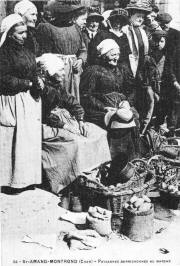
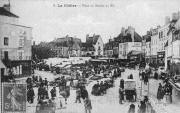
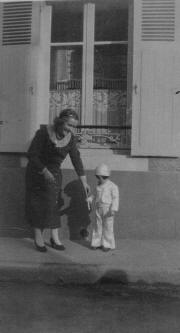
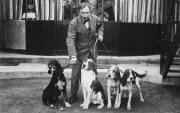
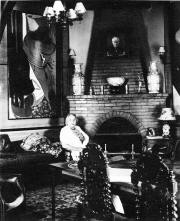
Docteur Guyot
in her living room
My real father and mother were, at the time of my birth, living on a
barge on the Seine in Paris. My father was a painter, which had been
accepted by his parents after several known artists were consulted and
had declared that my father had talent. The problem was the barge—no
electricity, no running water, no heat, no sewer. That was too much for
my bourgeois grandparents (grandpa was a doctor). They were convinced I
would die in that environment, so I was taken away without discussion.
The fact that my mother was a foreigner, a Canadian Native American,
must have played a role in the decision. But I think that the most
important, of course unstated, factor was that grandma had had only one
child (my father) and wanted another. Grandpa had been born into the
bourgeoisie. His father had also been a doctor. But Grandma was the
daughter of a very poor railroad worker with nine children. On his walk
in the native city of Montluçon, Grandpa had seen his future wife on the
threshold of her tenement building, falling in love on the spot. The two
eloped to Bordeaux, where he finished his medical school and my real
father was born.

![]()
![]()
![]()
![]()
![]()


Larousse Accident Compost Pit Slap Sotton Old Woman Solange
Bigoudi GGauthier Twins Pen Infanticide
Conversation Unclear Casino Threshold Michel Bombay
About Laure Acknowledgements Autrefois Go-top
![]()
![]()
![]()
![]()
![]()


Rainulfe and Solange
Chateaumeillant, Cher, France 1937-1945
In the 19th and 20th centuries, many Berichons
named their daughters Solange after the 9th century martyr
and saint. In 1877, a small pamphlet had just been written by L’Abbé
Joseph Bernard on the life of the young shepherdess killed by a young
nobleman, named Rainulfe, for refusing his advances. According to the
Abbé Bernard, the young woman, from a very pious, poor family, was
grazing her sheep near St. Martin d’Aubigny when a young man on his
horse came upon her and was stricken by her beauty, her innocence and
grace. Solange told Rainulfe that she was wedded to God and could not
answer his demands. The nobleman came back to the fields where her sheep
grazed, each time pleading with her to accede to his love, finally
offered to marry her, to share his castle and wealth. Solange did not
yield and always answered the same way, “I am married to God and,
therefore, cannot marry you.” On the 10th of May, 880,
enraged, Rainulfe took out his sword and severed her head. According to
Abbé Bernard and the legend that followed, she picked up her head,
carried it in her arms and dropped it in the nearby fountain, while
saying, “Jesus, my spouse, here I come.”
Today, on that spot, a sculpture of Solange stands, as well as a
small chapel, visited each year by thousands of pilgrims, mostly of
Portuguese origins, who may have conflated the legend of Solange, who
was canonized by the Church, with that of Our Lady of Fatima. The
sculpture shows a young woman without a head, with a sheep also with
severed legs, at her left.
The legend survives and is believed by many Catholics. Many
believers still name their daughters Solange. The writer George Sand,
who wrote many books on the lives and beliefs of pre-industrial Berry,
also named her daughter Solange. George Sand’s manor and hamlet at
Nohant are still standing and receive many thousands of visitors each
year.
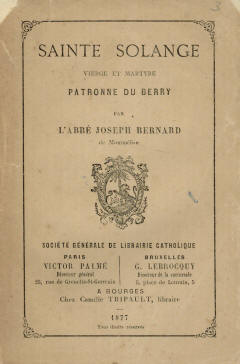
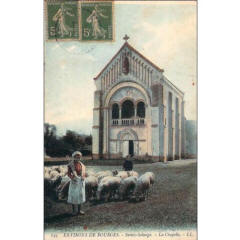

![]()
![]()
![]()
![]()
![]()
![]()
![]()
![]()
![]()
![]()
![]()
![]()
![]()
![]()
![]()
![]()
![]()
![]()
![]()
![]()
![]()
Larousse Accident Compost Pit Slap Sotton Old Woman Solange
Bigoudi GGauthier Twins Pen Infanticide
Conversation Unclear Casino Threshold Michel Bombay
About Laure Acknowledgements Autrefois Go-top
![]()
![]()
![]()
![]()
![]()
![]()
![]()
![]()
![]()
![]()
![]()
![]()
![]()
![]()
![]()
![]()
![]()
![]()
![]()
![]()
![]()
Bigoudi
Chateaumeillant, Cher, France 1937-1945
Some of the older folks in the village may have known his name. To
everyone else he was Bigoudi—a joke, perhaps, since he was bald,
although he always wore an old cap. Or he may have had a full head of
curls when he was young. When we knew him, he was of indescribable age.
But old.
He was small, very thin, sun-tanned, had no glasses and no teeth.
He wore the kind of jacket and trousers that all workmen and farmers
wore, made of a royal blue, heavy cotton that used to be made in the
town of Nimes in the south of France—hence, denim in English. Except
that Bigoudi's suit was no longer blue. It had become grey with a hint
of pale blue—an optimistic sort of grey, not the sad, pale, mouse grey
that children in mourning had to wear for a year. The black mourning
clothes of an adult were perhaps considered too harsh for children, too
sad, painful.
He was the town crier, since in those days few had radios. He
went from farm to farm on an abandoned grey German bicycle, bringing
news from town hall about electoral campaigns, agricultural association
meetings, news of births, deaths, marriages, gossip. On his back,
Bigoudi carried a small drum attached like a knapsack by two straps, and
he kept two small sticks in the jacket pocket (along with his tin of
bicarbonate of soda). Upon arriving in a neighborhood, he would
dismount, drop his bicycle on the ground, take his drum and sticks, and
beat a roll—the kind to signify attention—hear ye, hear ye. After
several doors or windows had opened, he would take out the notice in his
breast pocket and read, slowly but loudly. His speech lacked clear Ts
and Ds, but it was understood.
Bigoudi was also the town public alcoholic. In every farm he
visited, he was given a glass of our local wine for his effort—having
pedaled miles up and down hills and valleys on his old bicycle without
gears. We did not make fun of Bigoudi, as we would of other drunks, the
kind that staggered from the cafés after market on Friday afternoons,
who yelled at their horses and sometimes beat them. Bigoudi never
yelled, never insulted anyone. His alcoholism was his disease like the
tuberculosis affecting so many persons in our area. He was our crier
first; his alcoholism was his affliction and did not change our opinion
of him as a good man.
He carried in his pants pockets a tin can of bicarbonate of soda
from which he took a good mouthful after each drink. Our local wine is
called
vin gris.
It is a very acidic white wine made from the Pinot Noir variety of
grapes. The skin of the fruit is dark blue, but its flesh is pale green.
The wine is drunk as cool as possible. In the times of Bigoudi, no one
had refrigerators so it was brought up from the cool cellar before
drinking or put in the pail down into the well. It was consumed mostly
in summertime and was tart and refreshing. Also, it was very cheap. It
flowed on Friday afternoon at the end of our market days. There were
many cafés that were only the kitchens of people who owned a vineyard or
their relatives.
The press belonged to a cooperative of small growers, and it
would move from neighborhood to neighborhood at "crushing" time. It was
a small wooden press, the screw hand-carved from a tree trunk, usually
walnut, in our area. Men took turns in turning the press mounted on the
back of a wooden flat-bed chariot. The raw wine—really, grape juice—came
down via a small gutter protruding from the trough under the screw,
directly into a huge large bottle covered with wicker in the form of a
basket, easy to transport to the farm where the juice would go slowly
through its fermentation process. Barrels were sterilized by burning
sulfur sticks inside, slowly removing the oxygen and, therefore, all
aerobic bacteria. The yellow sticks of sulfur were held in suspension by
a large, deep, spoon-like piece of metal, whose handle reached outside
the barrel where it was fastened, a cork and cloth making the barrel
absolutely air-tight.
After the grape pressing was done and the juice sent to its
journey before becoming wine, a lot of residue—skins, stems—were left in
the trough under the screw. This unfermented residue was taken to the
"alambic"—the still—to be transformed into "eau de vie de marc". We
children would go to look at the beautiful machine, belonging to the
commune, all brass and copper, a long, horizontal cylinder with a burner
being constantly stoked with wood. It looked like the front end of a
locomotive, smoking, hot, shaking on its wheels, all of it immaculately
shining. On top was a long, spiraling glass tube, at the end of which
the raw alcohol would come dripping slowly into glass bottles. This was
the "eau de vie de marc," rare, precious, to bring back the sick to
health. Eugene, my grandfather's orderly and gardener, would tie a
bottle, carefully set on a little wooden platform in a pear tree so as
to enclose a just-forming pear. The pear would slowly grow inside the
bottle and, when matured, fall to the bottom of the bottle. You had then
a fully grown pear inside a bottle, the puzzle of many visitors who did
not understand how you could put a large pear into a small necked
bottle.
At the end of a day's work, he was often found asleep in a ditch,
his bicycle lying down on an abutment. Passing carriages would pick him
up and carry him and his machine back to his house. If no one came, he
just slept there. Bigoudi lived in the oldest part of the village known
as the "faubourg," a series of small stone houses set side by side, each
with only one door and one window. There was no electricity, no sewers,
and the only water available was at a public pump a few hundred yards
away.
In his unique position, wandering from farm to farm, he
encountered abandoned wheels, tires, metal objects, etc... Bigoudi was a
collector, and his house was said to be a real dump, which we did not
doubt, since he always wore the same dirty old clothes, summer and
winter.
A few days after the Allies landed in Normandy, everyone in the
village assumed that the war would soon be over. We all had visions of
American, English, Polish, Canadian soldiers parading through our
villages and towns. Under the direction of Mademoiselle Limousin, a
retired school teacher, we learned to sing "God Save the King," which
was the only song in English she knew. Looking through our old Larousse
dictionary (edition 1929), we found pictures of flags from every
country. We were put to work painting flags to string across the main
street when the Allies came marching in. America was to us the land of
plenty—plenty of soldiers, plenty of tanks and guns, planes, ships,
food, and liberty for all. We could not wait to receive the liberators,
and we strung up our line of paper flags (double-faced) across the road.
The liberators did not arrive when expected. From the few radios,
illegally kept from the authorities who had confiscated most of them, we
knew that the Allies were encountering fierce resistance and huge
casualties in Normandy.
It was Bigoudi who rushed into my grandfather's consulting room
to say that a German column was coming our way and we had better take
those flags down if we did not want to all be vaporized by guns and
flame-throwers.
One end of the rope was attached to the stove in my upstairs
bedroom and the other to Monsieur Thevenin's house across the street.
Eugene, my grandfather's orderly, was sent to untie the ropes and bring
down the flags. Eugene had been in the trenches with Grandpa in the
First World War and had come back to live in our town. He helped in
surgery, processed the x-rays, took care of the car, the garden, cleaned
the fireplaces, the gutters, the courtyard, while his wife Suzanne
worked with my grandmother in the house, cleaning, cooking, giving me my
weekly bath. They both lived in a small house with a big garden on the
outskirts of town. They came to work in our house every day except
Sunday. They had no children. Suzanne had had tuberculosis and my
grandfather had advised against parenthood, but they had been given, or
taken, the right to treat me as their daughter and they were the ones
who generally punished me when I had done something wrong. They kept a
cat-and-nine-tails whip in the kitchen that they used often on my
legs—gently. I knew that they loved me and I loved them as another set
of relatives.
Earlier on I had learned that they had the right to discipline
me. Eugene had given me quite a verbal and physical lashing after I had
snapped the heads of all the tulips in the flower garden—just to hear
the crack, the exciting sound. Complaining to Grandpa that Eugene had
beaten me, he replied "Good"—and that was that. Never to complain again
about what Eugene did to me—or Suzanne.
Eugene came downstairs with an armful of flags and ropes as three
German soldiers were ringing the doorbell. Suzanne was opening the door
painted with a big red cross on the right side. I was right behind
her—to see, as usual. The staircase to the upper floor came down in the
same corridor, fortunately dark. Eugene rushed into the surgery room and
hid the flags under the pad of the operating table.
This was 1944—after the landing. No more spic-and-span officers,
organized, clean, well-fed German troops. After the opening of the
eastern Front in 1941, we had seen the deterioration of the German army.
Most of their seasoned soldiers had been sent to the Russian Fron,t and
those left were young, very young, almost as young as I was, or old.
The three men at the door were young, dirty, disoriented. The one
in the middle, supported by his comrades, could not have been more than
16 years old and was the one in obvious pain, crying. No blood, though.
No visible wound. I do not know what Grandpa did to the soldier in
surgery but he said: "Poor kid—appendicitis. They understood that they
must take him to a hospital. I don't know if he'll make it in time. I
gave him a shot. What a waste!" When Eugene was changing the sheet on
the pad I saw the flag ropes and the corner of the Canadian flag—so
difficult to paint those sleeping lions—sticking out.
In less than 24 hours, the whole town knew that Bigoudi had saved
us—for the moment at least—from potential disaster. And he had not been
the one to spread the news. So Bigoudi was honored and feasted the usual
way. That day and for another week. A few more liters.

Bigoudi GGauthier Twins Pen Infanticide
Conversation Unclear Casino Threshold Michel Bombay
About Laure Acknowledgements Autrefois Go-top
Chateaumeillant, Cher, France 1936 - 1938
Monsieur Gauthier loved “his” titmice.
He had installed many birdfeeders in his beautiful garden. His
days, since his retirement as a mail carrier, were devoted to the upkeep
of his mini-paradise and its winged visitors. It would have been hard to
tell whether he had trained his avian friends or whether they had
trained him.
They flew toward him as he came out of his small house several
times a day to assure himself that the platforms and feeders he had
built throughout his garden were fully stocked with crushed seeds and
small cakes of suet.
His enemies, sworn enemies, were the neighborhood feral cats that
would come onto his property and lay in wait for a chance to catch one
of “his birds.” Mr. Gauthier was the self-appointed nurturer, defender,
protector of the birds in “his” domain. A war was on, and Mr. Gauthier
was determined to win it.
And he almost did.
First, he installed dangling bells in his fruit trees. Then, he
bought a stuffed dog that could only be put out on nice sunny days.
One day, Monsieur Gauthier bragged to my grandfather that he had
finally, definitely solved his “cat problem.” His solution was a
20-gauge. At dawn and at dusk, he would wait for the uninvited visitors
and dispatch them quickly to the status of former visitors. Mr. Gauthier
would then bury the dead animal at the foot of his trees, insisting that
it made perfect fertilizer.
Monsieur Gauthier was beaten by a flea from the body of an
“offender” and died of a plague-like ailment.
This was before the Second World War, before antibiotics had been
introduced to Europe. Mr. Gauthier had been a single man and left no one
to take care of “his birds.”
I had observed that most people either liked cats or dogs; my
grandfather did not like cats and definitely liked dogs, even loved
them. I inherited his inclination and spent a lot of time in the company
of dogs. There had never been a cat in my grandfather’s house, but there
were many dogs—retrievers, such as cocker spaniels, who were allowed in
the house and with whom I was allowed to play as I wished. Grandpa and
the cockers hunted small game, such as birds and rabbits.
The long-eared dogs, the Petits blaus de Gascogne, the
“little blues”, were kept apart and were used for hunting big game, such
as boars or bucks. These did not belong to Grandpa but to an association
of men who would hunt together. They were kept in a separate building in
the courtyard, and Monsieur Delebarre was in charge of their upkeep. He
exercised them every day in the fields and forest on the edge of town. I
was not allowed to go and play with them, but I often did. I could
always tell when Grandpa was out visiting patients, since his car was
not in the garage. That allowed me to sneak out to the doghouse, and
Monsieur Delebarre let me.
I found their ears irresistible and they seemed to enjoy my
caresses.
And their voices! Oh, yes, I loved their bark, deep bassos, “aooh,
aooh.”
Since Grandpa and his hunting friends were all doctors or
surgeons from other towns, all the dogs had been given medical terms as
names, all six of them., I remember Aspro and Ultra (for ultraviolet)
and X (for rayon X, French for x-ray).
I like to think that they had a good life, fulfilled their destinies.

Bigoudi GGauthier Twins Pen Infanticide
Conversation Unclear Casino Threshold Michel Bombay
About Laure Acknowledgements Autrefois Go-top
The Twins
Chateaumeillant, Cher, France 1938r,
France 1937-1945
Oh, yes, they had names. They were named Alain and Albert. But we called
them the twins because they were impossible to distinguish.
When very young, their father hung himself shortly after the
death of his wife from tuberculosis, so they had been brought up by
their paternal uncle and his wife. Since their uncle and aunt were
childless, it was natural that they had taken the role of parents.
This was before the war and the invention of antibiotics. Many
persons suffered from tuberculosis there and in the countryside; the
only treatment was a long and painful course of weekly injections of
air—yes, air—around the infected areas in the lungs, since the bacillus
is anaerobic. Success depended mainly on early detection. In the case of
the twin’s mother, her infection was very advanced, according to
Grandpa, who had been seen her shortly before her death.
Their uncle made harnesses and all things having to do with
horses and wagons, as well as mattresses. (In those days, when a couple
was married, they had a mattress made—a mattress that lasted a lifetime
and often more.) His shop, with living quarters above, was directly
across from the boys’ school, so the twins had only to cross the street
to attend classes. They were quiet, obedient, gentle boys and grew up
learning their uncle’s trade.
To the right of the shop was a vacant lot in which farmers would
park their wagons on market days. Next to this empty space were the
kilns, where limestone was blasted to become powder used in mortar for
construction or by farmers to add to their land, paint, fruit trees,
trunks, and walls against pests.
On the left side of the shop was a series of three houses: one
belonging to a notary; one to the headmistress of the girls’ school, the
feared Mademoiselle Chatelain; and the last one to Monsieur Laporte, one
of the three cobblers in town.
I told you before how all the houses in town touched each other
and shared walls with their neighbors. They were all the same design and
size; only the fronts had sometimes been modified to include a large
display window.
The houses all had the shop or store in front and the kitchen at
the back, looking out on a long narrow garden. The well was usually in
the garden, as was the outhouse (bathroom, to you). At night or in
winter, people used chamber pots.
Bedrooms were always upstairs.
When their guardians died, the twins became the sole owners of
the shop and continued their trade in their predictable, quiet, simple
way. They were excellent craftsmen, quiet men liked by everyone in town.
They did not go to church on Sundays and did not frequent cafés, but
they were often seen smoking a cigarette together in front of the shop
during their break from stitching and gluing leather at their long
workbench.
Having inherited a trumpet from their uncle, they both played in
the municipal band that rehearsed once a month in the town hall. The
band performed several times a year—on Bastille’s day, Christmas and
Easter, theatrical events, processions of the various trade guilds.
Their lives were shattered on a Friday afternoon when the widow Pitault entered their shop to have her horse’s reins repaired. Madame Pitault had just picked up her son after school to take him home to the farm she managed alone after the death of her husband from pneumonia. Remember, this is before antibiotics, and farmers did not go to see a doctor if they couldn’t afford the time or, if required, money.
Most diseases usually get better on their own anyway, doctors and
dentists cost money, and you do not have the time to saddle a horse or
hitch a wagon to go see a doctor or dentist who is going to send you to
spend more money at the pharmacist when you should be doing an important
task on the farm. That’s what farmers thought and said in those days
before mechanization, electricity, and water came to the isolated farms
scattered around Berry.
You’ve been to some of them and you know what I am describing.
Since you were there last in the 60s, most of those farms have been
abandoned, many destroyed. Yes, it is sad. This part of France has a
poor soil, cold winters, hot summers. Even big cities like Bourges have
many empty houses with for-sale signs that have been there a long time.
There are few industries in the area, so there are few jobs available
for the grandchildren of the farmers you knew. Oh, yes, there are still
a few who manage to make a living in ecological projects, but there are
few young people who can afford to buy ecologically grown farm products.
Most of the buyers in those splendid farmers’ markets are retired
people, mostly old women, living on a guaranteed income.
So, to come back to the twins.
When the widow walked in their shop, followed by her six-year-old
son, holding a torn rein, it was—well, we can only imagine. Madame
Pitault was, in fact, a very handsome small woman, extremely neat in her
attire, her dark hair tightly pulled back into a big chignon.
They must have felt thunderstruck, as in front of perfection,
looking at an apparition. That was It. Instantly. Forever.
Unfortunately, for both of them at the same time.
We know nothing of Madame Pitault’s reaction, whether she was
aware of the earthquake she had just created in those men’s lives.
We know nothing of the twins’ suffering, their discussions, if
they had any.
What we know is that a week later, a customer, finding the store
open but empty, went upstairs and found the twins hanging side-by-side
from the rafters of the attic where their father had hung himself 50
years earlier.
No one was surprised at their death nor at the method they had
used. Everyone was aware of their plight. Hanging was the most often
used way to end one’s life. It was clean and cost nothing.
Very few farmers owned hand guns. Most owned a long gun, and it
was a prized possession used for hunting only. Cartridges were handmade,
time consuming. Grandpa enlisted all of us to make cartridges every year
before the hunting season. (Actually, I just handled his gun recently,
and my friend Therese took a photograph. But I am digressing.)
Their caskets were carried from the shop to the cemetery by a
horse-drawn wagon and interred next to their mother and father. Most
people in town followed the hearse and talked about the inevitability of
their dual suicides, about history revisiting history, etc., but mostly
about the shop and, since the twins had no heirs, who would replace them
at their bench.
I was told that a young boy in the procession asked his mother why a woman
could not have several husbands, since there were men in the town who
were known to have several women. Everyone around him had to
suppress their laughter, given the circumstances.
Alain and Albert were 25 years old.

![]()
![]()
![]()
![]()
![]()
![]()
![]()
![]()
![]()
![]()
![]()
![]()
![]()
![]()
![]()
![]()
![]()
![]()
![]()
![]()
![]()
![]()
![]()
![]()
![]()
![]()
![]()
![]()
![]()
![]()
![]()
![]()
![]()
![]()
![]()
![]()
![]()
![]()
Larousse Accident Compost Pit Slap Sotton Old Woman Solange
Bigoudi GGauthier Twins Pen Infanticide
Conversation Unclear Casino Threshold Michel Bombay
About Laure Acknowledgements Autrefois Go-top
![]()
![]()
![]()
![]()
![]()
![]()
![]()
![]()
![]()
![]()
![]()
![]()
![]()
![]()
![]()
![]()
![]()
![]()
![]()
![]()
![]()
![]()
![]()
![]()
![]()
![]()
![]()
![]()
![]()
![]()
![]()
![]()
![]()
![]()
![]()
![]()
![]()
![]()
The Pen
Chateaumeillant, Cher, France 1937-1945
We all had, more or less, the same pen—a polished wooden shaft, a little
longer than a pencil, fatter at the end where the metal nib was
inserted, tapered at the other end.
In our desks, we had a box of nibs, fine ones for regular cursive
and slightly bigger ones to write titles and for special effects. The
ink wells were inserted in our desks and replenished every morning by
the teacher. The pencils were used to do our prep work in special
notebooks, called “brouillons”, in which we practiced before
transferring our work into the regular notebooks from which we were
graded.
We had two notebooks, one for writing, with horizontal and
diagonal lines to guide us in writing straight with the proper inclines,
and the other with unlined pages to do over our additions, subtractions
and, later, multiplications. The higher grades had many notebooks, for
geography, history, natural sciences, drawings and art.
Our pens, like our grey smocks, hung on pegs on the far wall of
the classroom opposite the teacher’s desk, were pretty much the same.
Except…except Jeanine Gaillard’s pen.
Jeanine lived on the same block on the main street, three doors
up from our house and sat at the desk next to mine.
I say “three doors up” because the street rose in elevation
before flattening on the plateau where the water pump was and the market
was held every Friday. Farmers came with their goods in horse-drawn
wagons and had to pay a toll before entering the town. There, an
employee of the town collected a fee at each end of the main road.
Another fee was collected at the end of the day, based on the amount of
merchandise sold during the day. Like most French towns built at the end
of the 18th century, the houses of unpainted stucco were
aligned side by side on each side of the road, only one house deep, with
a garden in the back. Only stores had a wooden façade and large glass
widows with their displays of shoes, cloth or hardware, breads, meats.
The farrier, wood and coal merchant had opened yards where you could
enter with your horse and wagon. There were very few cars, no running
water, no sewer systems, only electricity. This did not extend to the
outlying hamlets or isolated farms. Electricity was only installed
later, after the war.
The traveling, itinerant merchants, who went from town to town on
different market days, had small “camionettes” (small delivery vans) to
carry their goods: working clothes, rubber boots, veterinary supplies,
hardware, pots and pans, and a bazaar where all school children would
rush at the lunch break.
The bazaar was a large tent of canvas, sheltering tables covered
with stationary supplies, notebooks, pens, pencils of all colors, chalk,
slates, drawing pads, rubber bands, small toys made in Japan, marbles,
threads and needles, scissors, zippers and buttons. All objects cost
less than one franc. It was
called the “Bazaar à 20 sous”. Most of us did not have the few cents to
buy anything, but we all went to look. I especially coveted the tiny
colored paper flowers from Japan that, when you put in a glass of water,
opened up to reveal lotuses and chrysanthemums. They conjured up a world
of mystery and exoticism.
Some of the pens displayed were prettier than the ones we used
and were also a source of fascination. None we ever saw was as elegant,
as fascinating and beautiful, as Jeanine’s.
Her pen was made of white bone. The thin end up in the air was
terminated by a carved small fan-like piece in which was inserted a
small glass bead. When held closely to the eye, a landscape was revealed
inside the bead. Jeanine had received the pen from an uncle who had gone
to Vichy, then a renowned spa where people went to “cure” various
ailments, especially of the liver by drinking the water from ancient
springs used by the Romans.
The landscape in the little marble showed a mountain with snow
and a town at the bottom. To us, it was magic and beauty.
Jeanine was not a pretty girl. She was the tallest girl in our
class, very tall for her age. Her features were plain, her hair a
nondescript chestnut brown, and her way of moving, her allure, was very
ungainly: her feet were too big. She was not a very good pupil, could
not sing, could not do most of the gymnastics. Under the roof-covered,
open area where we did our physical exercises every day, was a straight
rope, trapeze and rings, and parallel bars. Jeanine had never been able
to lift herself off the ground. Perhaps, her large feet and heavy bottom
prevented her from springing up. We would have made fun, ridiculed
someone else unable to do what everyone else could. But we did not
embarrass Jeanine. Because she was the owner of that wonderful pen. She
allowed each of us to hold it and peer through the marble,
sometimes—sometimes not. She knew that her pen was her key, her passport
to our games at recess when we played “house,” or “school” in the empty
coal bin in the yard, by drawing the outlines of rooms in the ground
with a stick, complete with drawing tables, beds, stoves or teachers’
and pupils’ desks. All Jeanine had to do was to present herself and say,
“Can I play?” and she was “in.” Because of the pen. We knew it and she
knew it. No one need say, “Can I look at your pen later?” We knew value.
And the pen was of great value to us, like the skin of an orange
or tangerine. Very few families could afford such fruits, a rare,
tropical delicacy coming then from Africa or Spain. An orange was a
Christmas present worth dreaming of. The lucky recipient of such a gift
could barter the use of the skin for favors. It was loaned on an hourly
basis, and the borrower could wrap it in her handkerchief to transfer
the essence and carry it in her pocket as a treasure. Every day the
piece of rind lost some of its value, as the skin became dry, odorless,
and the magic evaporated. The fee became cheaper.
The pen, on the other hand, never lost anything. It was there for
the whole class to see each time Jeanine opened her little wooden box
with the sliding lid. We all had such a box in our “cartables”, in which
we carried our notebooks and our homework to and from school. Some
“cartables” were made of heavy canvas, some of leather, which we
recognized as superior. The farm children had cloth bags, the merchants’
daughters had leather bags. Jeanine, of course, had a leather satchel.
Her parent owned the “charcuterie”, located, like our house, on the main
street. There was another charcuterie in town, but it was not on the
main road with a fancy glass front, sparkling clean, with hyacinths in
pots among the display of sausages, salamis, and patés, cornichons
in glass jars, and even pickled mushrooms at holiday times.
Jeanine’s father was a huge man, probably the tallest man in
town. His workshop was in the basement of their house, where he chopped
ground meat with a hand grinder and filled cleaned animal guts. With
meats for sausages and salamis. Hams hung from hooks in the ceilings.
There was no refrigerator, and no one had ever seen one, but there was a
cold room filled with ice blocks, and the basement was itself very cold.
Sometimes, in the summer, my grandmother would send me to get a few
pieces of ice to be put into drinks.
Monsieur Gaillard, whom I called Papa, as I called many men in
town, was a gentle man, soft spoken, generous with his time and, I
think, exceptionally affectionate with me, since my grandfather was his
doctor and neighbor. Madame Gaillard was a small dark-haired woman who
rarely smiled—she kept the store upstairs.
Usually in the rest of her house, meticulously maintained, she
would rush to the front as soon as the bell installed on the back of the
front door rang. She served her customers with cold efficiency after
donning an immaculate white apron hung between the living room, dining
room, and the store. I never knew whether she was really “like that” or
whether she played a role that had become a habit. No one in town would
have called her a pleasant person, but her husband was esteemed as a
splendid “charcutier” and a good, honest man.
Jeanine was their only daughter and knew that she would take her
mother’s place later. Obviously, she had inherited her father’s physical
appearance, down to the big feet, but had the reserved behavior of her
mother, a certain coldness with others. Perhaps her unusual height was
responsible for that look of haughtiness, nose turned upward, away
naturally above the rest of us.
Still, living three doors up the street, the only other girl in
that bend of the road, made her my natural playmate. The games for girls
were simple: we played house or school, our models. Only the boys played
ball. Playing house was to delineate areas as kitchen and bedrooms, and
mimicked the roles of our parents—or in my case, grandparents—going in
and out of the spaces imagining doors, windows, walls. The “father”
would go out to work, come home, play with the children. The “mother”
would cook on the imaginary stove when there was not a toy one, clean
and dress the babies, sweep and dust the house, entertain neighbors with
“tea sets” or cups and saucers borrowed from the real mother. Playing
school meant taking turns being teacher or student, giving assignments
and orders and fulfilling them.
I had greater fondness for an older girl called Rosette who lived
a little farther—maybe three hundred feet—but her playmates were already
teenagers. Her father and my grandfather played bridge in the evening
together, and he was a well-informed man who shared my grandfather’s
political leaning to the left. I sometimes went to play with her and her
friends, but I was always assigned the role of baby or child because of
my age.
With Jeanine, by necessity, I was either father or mothe,r and
that gave me a better feeling, although I wished that I could be older
and play the same roles with Rosette.
Rosette’s parents owned the Emporium, a general store on the main
square where you could buy furniture, baby buggies, dishes, notions,
even bicycles. The store was the largest house in town with an upper
floor filled with furniture where it was a delight to play house.
Rosette was pretty, dark-haired and always the best-dressed girl
in town. But she was older and she did not live almost next door. I
could not come unannounced and say, “Can I play?” the way I could at
Jeanine’s house, knowing that she would be there and that I could go to
the basement anytime to watch her father work. Her grandmother made
pâtés, lined up in the cold room in identical terra cotta tureens before
being sent upstairs to the store to replenish the supply. They gave me
my inspiration to play “store” when I was alone at home, putting
identical pieces of cut paper in a row to represent the pâtés, and cut
pieces of kindling became salamis and sausages. Hams were drawn on
paper. In my imaginary store in a corner of the kitchen, I would be both
Madame Gaillard and her customers. As customer, I would enter the store,
order something, ask how much it cost; then, changing position, would
give greetings, answer as Madame Gaillard, give prices and change by
counting imaginary coins, small rocks, and a few buttons.
I really did not like Jeanine as much as I liked other girls,
especially Rosette. Sometimes I did not like her at all. But what could
I do? She lived almost next door, and she owned that marvelous pen that
she allowed me to hold, sometimes.
And that had to be enough.
The trouble began on a Tuesday morning, as we were filing out of
the classroom toward the covered area where we did our daily gymnastics.
From the rafters, hung the rings and straight ropes. Marie-Rose, who had
been several rows behind me, managed to come beside me.
“Wait ‘til you hear what happened,” she said.
“What?”
“The pen has disappeared.”
“How?”
“Disappeared, you dope. Dis-a-ppeared. It’s not there, and
Jeanine has told Mme Perrin.”
I was speechless. How could such an object disappear? It stuck
out like a chandelier in a stable.
“What are we going to do?”
“Well, I don’t know but it better be found soon or we will all be
under suspicion.”
“Why?”
“What else?”
The enormity of the news was beginning to sink in.
“Who do you think could have stolen it?”
“Stolen? Oh my God!”
Jeanine’s feet were on the ground as she was trying to lift her
big body up to no avail. As usual, her bottom just weighed her down. She
tried, her arms in the right position above her head clutching the rope
with all her might, trying to lift the rest of her body. But there was
nothing doing. Her legs could not push the earth away. There was just no
spring in her. She had never been able to do it and never would. All she
could do was squat.
Normally, we who could climb the rope would have rolled our eyes
with a mixture of disdain and sympathy, but today we were all sympathy
and Jeanine looked around with the face of someone in the condolences
line at a funeral. We all wanted to express our sympathy but dared not,
afraid that it might imply complicity.
But we knew that everyone else in our class knew. Jeanine’s
mother, being an assiduous churchgoer, had told Father Morin, so it was
no surprise when, next Sunday, his sermon focused on the commandments.
When he got to the one about not coveting your neighbor’s wife, he
added: “And that goes for coveting anything. Do you hear me, children?”
We of Mme Perrin’s class knew what he was referring to. By now, we knew
what coveting was. According to the catechism class, when asked to
describe coveting, the good father had explained that it was something
before fornication and that it led directly to Hell. Outside of the
church we had giggled ourselves silly. In a small town of less than
2,000 inhabitants, everyone knew who was fornicating with whom. And, for
the ones younger than ourselves, we showed the superiority of our
knowledge by using hand language description of the act, which we had
seen the older boys make. You put the middle finger of your right hand
next to the end of your right thumb. Then, having formed a hole, you
inserted your left index finger into the circle and moved it back and
forth. Most of the younger girls knew enough already to understand the
gesture, but there were still some who did not understand. We left them
with disdain, calling them too young to know the facts of life.
If the whole class knew of the theft, we assumed that the whole
school knew. And if the whole school knew, then the whole town must
know, since some girls had brothers in the boys’ school.
We felt as if the whole town of 1,900 inhabitants was looking at
us as coveters, thieves, and what not else. The pen had become as
valuable as a work of art.
There were only three telephones in the town. The gendarmerie was
number 1; my grandfather, the doctor, was number 2; and Mr. Lebrun, the
veterinarian, was number 3. To call, a farmer had to go by wagon or
horseback to the nearest post office. Most people lived in isolated
farmhouses or small hamlets, but wherever there was a
café/restaurant/bread depot, there was a post office and a telephone. Of
course, everyone could hear what you had to say, since one had to speak
very loudly, sometimes scream into the mouthpiece.
A few days later, the local gossip had it that the pen was made
of gold with a precious stone embedded in it.
That is when my grandfather asked me into his office, sat me down
across his desk where a patient normally sat, and asked, boring into my
face with his x-ray eyes:
“Did you take Jeanine’s pen?”
There was no space for anything, any words other than yes or no.
His eyes, as usual when he wanted to, occupied every inch of my being.
“No,” I said.
“Remember, when you want something that is not yours, you
surrender your power, your money, and sometimes your life. You may go
now.”
Walking down the long, dark corridor to the living quarters, I
pondered Grandpa’s words. You did not take his teachings lightly. You
paid attention. I think I got it, more or less. You paid attention to
all Grandpas—their age endowed them automatically with knowledge of
places and things, wisdom to analyze men’s problems, experience to sort
out others’ feelings.
Grandmas, too, had their domain of knowledge, mostly in the world
of women and children. Also, small animals. Of course, sometimes old
folks lost their minds and their abilities. This was understood as the
normal consequences of aging, like limping old dogs and lame horses, and
did not deter in the least from our respect and sometimes awe toward our
gray-haired neighbors.
That is the way it was 70 years ago in our small town in the
center of France.
P.S. The pen was found several months later in the dust of the coal bin
in the corner of the yard where we used to play “house.”
Jeanine married her father’s apprentice and, when her parents
died, she became the “charcutiére,” running the shop as her mother had,
her husband working downstairs where her father had.

![]()
![]()
![]()
![]()
![]()
![]()
![]()
![]()
![]()
![]()
![]()
![]()
![]()
![]()
![]()
![]()
![]()
![]()
![]()
![]()
![]()
Larousse Accident Compost Pit Slap Sotton Old Woman Solange
Bigoudi GGauthier Twins Pen Infanticide
Conversation Unclear Casino Threshold Michel Bombay
About Laure Acknowledgements Autrefois Go-top
![]()
![]()
![]()
![]()
![]()
![]()
![]()
![]()
![]()
![]()
![]()
![]()
![]()
![]()
![]()
![]()
![]()
![]()
![]()
![]()
![]()
The Infanticide
Chateaumeillant, Cher, France 1937-1945
Monsieur Perronet had bought the café-restaurant around 1930 from the
Renaud family, who had owned it since its beginning. It was situated on
the main square, called La Grande Place, where the Friday outdoor market
was held. There was another market, also on Fridays, less than a mile
away on a place called the Champ de Foire, where cattle, oxen, cows,
sheep, and pigs were sold. Few women or children went there. Only
farmers in blue smocks and boots traded there.
The market on the Grande Place was where housewives went to buy
butter, cheese, fruit, and vegetables and small animals like chickens or
rabbits.
There were also many stands and vans with awnings selling
sundries—ribbons, buttons, aprons. Also, a large tent with tables
covered with school supplies, small toys, china and cutlery. On the
Place was also a public pump, where many children on their lunch-break
would be sent to fetch water in large, vertical metal pitchers called
brocs,
since most houses did not have running water. Friday was the day of
excitement for the children. So many people gathered in one place for a
few hours. So many things to see. So much noise.
The café had a few tables and chairs outside with a short awning
of faded green canvas. Its outdoor space was demarcated by two rows of
privet bushes in wooden tubs, separating it on one side from the
hardware store and the other side from the fabric shop.
On market days, all chairs were occupied by men only, since it
was not considered a proper place for women. Men drank red or white
local wines, smoked, talked loudly, and sometimes played cards—things
that women did not do. But it was exciting to watch. It was understood
that farmers, accustomed to working outdoors, spoke very loudly to each
other and to animals in order to be heard over great distances. Women,
on the other hand, were supposed to talk softly at all times, and, if
you raised your voice, you were accused of being a horse cart driver, a
"charretier".
The café also had a restaurant room used on special occasions,
such as weddings or guild meetings. There were several guilds in the
town, representing metal workers, wood workers or wine makers. Each
guild had its own parade with decorated chariots, a fanfare, or local
musicians that would end the day with a banquet. Women and children
helped in making the crêpe-paper flowers that adorned the chariots but
did not share in the banquet. This was a man's affair with much eating,
drinking and loud language probably not suited for delicate ears. But
the parade was fun.
Monsieur Perronet did most of the cooking on feast days with
hired help in the kitchen. Every other day, Vincent was his only helper.
Vincent was an older man with a limp caused by an injury in the First
World War. He lived on the outskirts of town, was married, and had three
children. Always cheerful, with black trousers, white collarless shirt,
a black satin vest, a long white apron and a folded dish towel on his
left arm (to wipe tables). He shuffled, not without grace, between
tables carrying glasses on a tray held above his head with his right
arm.
Manon was the young woman who cleaned and washed the tiled floor,
washed dishes and cleaned the apartment above, where Monsieur, Madame,
and Mademoiselle Perronet lived. Manon had been in foster care since her
birth but had recently reached her fourteenth birthday and had been
released from the "Assistance" to work for wages. She had a room in the
attic. The café was her whole world and she rarely left it. She was
considered competent, clean, diligent, unassuming, and rarely noticed by
anyone, since her work upstairs occupied most of her days.
She cleaned the café at the end of the day, when most clients
would have returned home or to their farms. A few men might stay in the
evening to play a game of "belotte", a card game, especially in summer
time when the days were long. Few people would be outdoors when the days
were long. In the evening people stayed home, worked in their gardens,
and children did their homework.
Madame Perronet would sometimes come down from her apartment to
stand behind the cash register, sitting on a high stool. She was a very
small person with grey hair and claimed to be always in bad health since
the birth of her only daughter, now in boarding school, fifteen years
earlier. Her clothes were immaculate and of fashionable cut, the kind of
clothes copied from fashion books by a very good dressmaker, of whom
Madame Thevenin was reputed to be the best. She wore no make-up and her
hair was tied in a perfect chignon behind her head. She looked severe or
pained.
Monsieur Perronet, on the other hand, was a large, vigorous,
jovial man, always joking with his customers. He, like Vincent, wore
black pants, white shirt, black vest, and a white apron.
All goods needed by the café—ice, wines, food stuff—were
delivered by vans called "camionettes", and the whole town could tell
the days of the week by the vans in front of the café. One would say,
"Oh! it must be Thursday; the ice van is here!" In a town of less than
two thousand inhabitants, everyone knew everyone, where everyone went,
what came in, and what went out. We even knew every dog and every cat.
They did not need collars to tell us to whom they belonged.
Of course, everyone knew who had extra-marital affairs, where
couples met (by the lake), or who had a mistress in another town.
Farmers did not have affairs. How could they, stuck to their farms seven
days a week? A few town people had vans. For example, Monsieur Dupuis,
who owned the Emporium, the store that sold furniture, bicycles, baby
buggies, had a delivery van. We knew that his van was seen parked for
hours by the house of a widow in another village, and he was not
delivering furniture. Well, good for him, everyone thought, his wife is
a dried raisin.
Monsieur Perronet did not have a van. Madame Perronet stayed home
upstairs. Manon stayed there, too. So, how could it happen that Manon
was found in the "cabinet", half dead in her bloodied skirts and
petticoat by a customer needing to use the facility? The "cabinet" (the
toilet) was at the end of the courtyard behind the café. A small wooden
structure with a cement floor and a hole above the septic tank. No
electric light and just a small hook inside the door. Barely four feet
square. A stinking place in summertime.
The gendarme came and took Manon on a stretcher to the hospital
and a few days later to an institution in a larger town where such women
were to be re-habilitated. Some sort of special prison, we knew. Yet, no
one had noticed that Manon was pregnant. No one ever noticed her,
pushing her wet mop at the end of day or cleaning upstairs. Children
from the "Assistance Publique" were sometimes more or less adopted by
their foster parents, farmers who needed the money paid them by the
government to take care of orphans or unwanted children. Sometimes they
were exploited for their labor but most of the time became one of their
adoptive parents' family.
Every child from the "Assistance" had to go to school until the
age of fourteen. All schoolchildren knew who was from the "Assistance".
It meant that you would not continue your studies, since you would have
to work, that you did not have a real father or mother to protect you
unless you had formed a bond with your foster parents. And we all knew
who considered their foster parents
parents
and who did not. Those who were not attached to their foster parents,
who had been moved often from place to place, were regarded as lesser
human beings, defective in some way. We never took into consideration
the traumas or hardships they may have endured, since those pains were
unknown to us. Therefore, it had to be their fault somehow, a defect of
character, a lack of normal intelligence, a failure of will.
Since Manon had moved several times, from foster home to foster
home, she was regarded as defective, mentally handicapped and, as such,
erased, washed from the general consciousness. She was just there like
the broom she pushed so assiduously in the café. How could but a
half-wit become pregnant and drop a baby in a septic tank? Did she even
know she was pregnant? And by whom?
In a small rural town, everyone, including children above the age
of eight, knew the facts of life. There were cows in the fields, rabbits
in hutches in everybody's backyards, cats, dogs un-neutered everywhere.
That "girl" (that's what Manon was called in conversations) never
went to the lake. Never went out. So?
"It takes two to tango, no?"
So, everybody put two and two together (or, rather, one and one)
and came to the conclusion that only one man could have impregnated
Manon.
My grandfather talked about the pain, the loneliness, the
humiliation of the girl in that dark cabinet. How ignorance kills the
soul and often the body. How terrible a sin it is for the society to
treat women in such a cavalier, condescending manner. But his remarks
were reserved for the family, around the table at dinnertime. Monsieur
Leblanc, the veterinarian who came once a month to play bridge with my
grandfather and shared his political views, understood and agreed. Both
knew that Vincent could not have been the father, since he never was
allowed upstairs, that he went home at the end of day on his rickety
bicycle to his wife and children. That left only one man.
He was never questioned by the authorities. The general consensus
was to leave things alone. Why make a fuss? The thing was done, the girl
was gone, and there were so many things to be attended to—the farms, the
animals, the vineyards. Everything was forgotten, and we school children
looked forward to the next Friday market.

![]()
![]()
![]()
![]()
![]()
![]()
![]()
![]()
![]()

Larousse Accident Compost Pit Slap Sotton Old Woman Solange
Bigoudi GGauthier Twins Pen Infanticide
Conversation Unclear Casino Threshold Michel Bombay
About Laure Acknowledgements Autrefois Go-top
![]()
![]()
![]()
![]()
![]()
![]()
![]()
![]()
![]()

Conversation
Petaluma Ca. USA 2008 - 2016
·
Why do you need to believe that some men are good?
·
Because, I suppose, I don’t want to believe that the whole enterprise is
a mistake.
·
Is it?
·
Mostly, I think, yes. Men are not finished. They are still evolving. He
has to perfect himself constantly. Evolution, you know.
·
Do you know some good men?
·
Good in parts—yes—some better than others.
·
Good. Better—naturally?
·
Naturally? No. I think all possibilities are there at the start. It
depends which ones are encouraged, nurtured, valued. On the time, the
place, the circumstances, the mother.
·
Why do you add the mother?
·
Because I think she transmits the good, the shameful, and the bad of any
culture. She is made to forget her dependent behavior, her collaboration
with trinkets, turned into a shopping addict.
·
And the father?
·
Oh, the poor bugger, he is not to be trusted. His convictions; his
principles are determined by his vanity and his financial interests.
Wants to appear bigger, richer, smarter than he is.
·
Aren’t there places where it does not apply?
·
I don’t think so. But it takes different forms.
·
I’m afraid so.
·
Then how can change happen?
·
Violently, when we can no longer breath, when our waters will be
undrinkable and decent food, housing unaffordable.
·
Why does it have to be violent?
·
Because people always hope that change will happen by itself or that
others will make it happen. When nothing changes in their lives’ time
and they see no hope in sight—then, only then, they rebel.
·
They have to be deeply affected and have nothing to lose. Is that what
you’re saying?
·
Yes, change is always violent—birth of anything, new lands from volcanic
eruptions, human and animal birth, cracking glaciers—the whole natural
order of cat eat mouse.
·
Whoa! That’s not a very pretty picture!
·
It can be beautiful, too, if that is your priority. There is enough
natural beauty for man to emulate. Artists know about that. There are
beautiful thoughts articulated in poetry, music, painting, dancing,
architecture, even those that depict pain, ugliness and despair.
·
Why do you call it beautiful if it depicts ugliness etc?
·
Because it teaches us about ourselves and what we are capable of doing,
thinking, feeling.
·
How can that be violent?
· It is violent in the sense that it displaces a preconceived view, a deeply ingrained prejudice or accepted assumption.

![]()
![]()
![]()
![]()
![]()
![]()
![]()
![]()
![]()
![]()
![]()
![]()
![]()
![]()
![]()
![]()
Larousse Accident Compost Pit Slap Sotton Old Woman Solange
Bigoudi GGauthier Twins Pen Infanticide
Conversation Unclear Casino Threshold Michel Bombay
About Laure Acknowledgements Autrefois Go-top
![]()
![]()
![]()
![]()
![]()
![]()
![]()
![]()
![]()
![]()
![]()
![]()
![]()
![]()
![]()
![]()
Exact Title and Structure Unclear
Petaluma Ca. USA 2008 - 2016
“An Augean stable of metallic filth”
D. H. Laurence
King Augeas had 3000 oxen kept in
stables uncleaned for 30 years —Imagine!
On my first visit here 50 years ago, I had already noticed how noisy and
dirty it was.
But now! Even the North and South Poles, where no one lives, are
littered with garbage, mostly plastics in and out of the water.
Every one uses a vehicle, even to go a few blocks. Gasoline
driven machines! (in 2010!) The air is saturated with CO2. They still
use coal to fire furnaces, too! They have to purify their water. Their
seas, rivers, lakes are fouled by leaching pesticides, oil and
chemicals. What are their scientists thinking? How can they keep on
using the same methods of producing food and goods? Their cities! So big
that at times the traffic does not move. Their buildings, even their
dwellings, are huge. Families do not share space. Everyone has a room,
separate, and a bath separate, also.
REPORT ON THE LIFESTYLE OF THE MIDDLE CLASS IN MIDDLE WORLD
The first thing to strike the visitor is the size of things.
Their houses are huge. They do not share space if they can avoid it.
Each bedroom has a bath. There is even one in the hallway for visitors
and a closet to hang coats. There is a garage for several cars. Each one
living in the house has a car, sometimes two, and a truck. They have
every imaginable tool for gardening and carpentry, in case you need it.
There are bicycles, skis, sometimes even a boat. The garage is that big.
The kitchen has all the gadgets a professional cook needs; a granite
center counter to prepare food for a battalion where they only fix a
breakfast of cereal and milk.
They are rarely home during the day, for both adults work hard in
some store or office. Their garden is magnificent—a copy of one
advertised in the glossy “Home” magazines. A maid comes to clean house
twice a week and a gardener maintains the showcase grounds. Most of the
material used in the building of the house, from the floor tiles in the
kitchen and baths to the plumbing fixtures, are imported from other
countries. The architecture replicates the elements of Italian villas,
English manors or French country houses. Most of the cars are also
imports.
They produce an enormous amount of garbage, debris and discards.
Their dumping grounds have as much acreage as small towns. Many of the
objects thrown away (furniture, toys, tools, house fixtures) are in good
working order. Their lands and water are polluted by toxic materials
leaching into the soil. Plastics float everywhere. Their agricultural
practices destroy the land they exploit. Very few wild plants and
animals survive the encroachment of their habitats by constant housing
development accompanied by its polluting consequences.
The two children (these are ideally two—a boy and a girl) go to
high school in their own cars. The parents leave for work at the same
time or earlier. Each one is independent of the other. The children
choose their clothes, their foods, their entertainment. They rarely eat
together except on organized trips or at a once-a-year clan gathering.
Most of the time, they keep in touch with each other via cell phones.
They keep in touch with their friends via email or texting. They call it
“doing your own thing.”
Everyone constantly talks on their cell phones: from their cars,
their houses, inside stores. They seem lost when not holding the gadget
to their ears. They need to tell someone where they are, what they are
doing, seeing, hearing, feeling, perhaps. Even their cars tell them
where they are, as if they could not read a map or ask directions. They
feel lost without it, as if others were not to be trusted, themselves
included. Without all this metallic and electronic technology, they do
not know who and/or what they are. Without it, they are bored and
feeling inadequate, incomplete, humiliated. Unfortunately, their
acquisitions are obsolete or out of style the moment they buy them, so
the desires for the latest thing called “better” is never fulfilled.
In their bathroom the medicine cabinet looks like a
mini-pharmacy. There are drugs for sleeping, for staying awake, for
pains of all kinds, for stress management. Cosmetics abound, although
they often go to a hair salon—sometimes once a week. They visit
masseuses and chiropractors often. They have many diseases of the body
and the mind, hence their great consumption of pharmaceutical products.
Although they own one or more exercise machines, they regularly
go to “health clubs,” where their movements are organized and
supervised. They do not seem to be able to make any of the objects they
use. Everything is imported from other parts of the planet where some
of them are kept poor in order to be forced to work in horrible, noisy,
smelly, toxic places to produce what the MIDDLEWORLDERS need.
The women seem to enjoy holding and playing with their offspring,
but once these become teenagers, the parents despise them. The children,
in turn, show no respect for their elders. When they reach sexual
maturity, the children are given vehicles and sent to wars. There are
always wars—one country invading another to control whatever mineral
resources the invaders need. They repeat the experiences of the Greek
and Romans, only the killing is faster and more efficient. Obsolete
military hardware (planes, tanks, etc.) occupy miles of ancient
grasslands. Functioning military camps and installations use up many
thousands of acres more. Wars appear to be their accepted form of birth
control.
Raising children is very expensive in MiddleWorld. To keep pace with the
advertised view of success, parents must buy new clothes, new toys, new
gadgets for their children, even if the ones they already have are still
usable. Education costs a lot, and parents resent this investment if it
does not bring the desired results, hence the disappointment and
distance created between parents and offspring.
Very few Naciremas grow their own food. Everything is flown or
trucked in, sometimes from very far places where other poorer people
work on large plantations or farming. They do not appear to know what
food is good for them, for about one third of them look visibly blown
up, unhealthy. They also drink tremendous amounts of alcohol, not just
for feast days.
Their cities are noisy (mostly from their vehicles) and their air
has a nasty odor. They release great amounts of carbon dioxide into the
air from burning fossil fuels, which they then breathe. Their scientists
may not have developed other energy sources yet.
They cannot stand silence. Their air is constantly filled with
noises, metallic and electronic noises, many of them must damage their
ears.
They cannot stand open spaces. Their parks, lakes, mountains and
sea shores are crisscrossed by huge vehicles, boats, ski mobiles, snow
mobiles, planes. The most remote of their deserts are invaded by SUV,
motorcycles and airplanes. The Naciremas hate to walk except as an
exercise.

![]()
![]()
![]()
![]()
![]()
![]()
![]()
![]()

![]()
Larousse Accident Compost Pit Slap Sotton Old Woman Solange
Bigoudi GGauthier Twins Pen Infanticide
Conversation Unclear Casino Threshold Michel Bombay
About Laure Acknowledgements Autrefois Go-top
![]()
![]()
![]()
![]()
![]()
![]()
![]()
![]()

![]()
Casino
Petaluma Ca. USA 2008 - 2016
Joe, my neighbor, told me about it: “Just get on your horse and go to
look at the freeway from the hill, next Friday at 5 p.m.” I did. Could
not believe my eyes. Going north, bumper to bumper, not moving. Came
back one hour later, and the car I’d mark as a reference had just moved
half a mile. What the heck? Next day, I went by Joe’s place about
mid-morning thinking he’ll have done his chores and maybe a cup of fresh
coffee would accompany the chat. Right I was. We sat down in his cool
kitchen, cool because there are trees all around his house, because it’s
painted white and sparsely furnished.
He is the one that started.
“Did you see it?”, he said.
“Sure did, but where were they all going?”, I asked back.
“There’s a new casino right up the road a bit,” he informed me.
“Son of a gun! Another one of those?”
“Yep.”
“What do people see in them, I wonder?”
“More people, that’s what they see.”
“What would they want to do that for, see more people?”
“Because they’re lonely, I guess.”
“Lonely? Don’t they work?”
“Oh yeah, they work, they see people but they’re still lonely.”
“I sure don’t get it. How do you get lonely when there’s so much
to do?”
“Maybe it’s because they don’t like what they do, or they don’t
care because it means nothing to them.”
“How can you not like what you do and do it?”
“That’s what most people do, Pete. They work to make money to buy
things, but they don’t like what they do. It has no meaning for them.
Sometimes they just hate it but keep doing it to pay their mortgage or
their rent, put food on the table, and send the kids to college. They
can’t stop once started—they have to keep going till they drop.”
“But what’s the casino got to do with that?”
“That’s the escape, Pete. Escape in an artificial world where you
see people like you, trying hard to see if God would smile on them, just
for once.”
“Oh, my God.”
“You said it. You and I are alone but never lonely, but what we
do is our lives. Taking care of the land and the animals. We’re needed,
and we do our job with all we’ve got. We sleep well because we are
content to do what we do. No need for casinos for us. A new calf or a
good rain has more meaning than their slot machines. A good neighbor
like you means a lot, and you’re good because you do, well, what you do.
We have good times together—picnics, fishing, hunting, just sitting
talking. Like now.”
“Well, I guess we may be the last to feel that way.”
“Yep.”

![]()
![]()
![]()
![]()
![]()
![]()
![]()
![]()
![]()
![]()
![]()
![]()
![]()
![]()
![]()
Larousse Accident Compost Pit Slap Sotton Old Woman Solange
Bigoudi GGauthier Twins Pen Infanticide
Conversation Unclear Casino Threshold Michel Bombay
About Laure Acknowledgements Autrefois Go-top
![]()
![]()
![]()
![]()
![]()
![]()
![]()
![]()
![]()
![]()
![]()
![]()
![]()
![]()
![]()
On the Threshold of Time
Petaluma Ca. USA 2008 - 2016
There she sat, in a shaded alley in the Jardin Catherine-Labouré on Rue
de Babylone, not because it was the neighborhood where she lived more
than fifty years ago (the park did not exist then), not because she felt
any nostalgia for the specific area (or did she?), but because it was a
cool place to relax, contemplate, reflect, think about what she was
doing there. Her trip had been planned with a friend from California
where she had lived for the last sixty years, but her friend had a
medical emergency a few days before their departure date. Now she was
alone and feeling lonely. She had gone to the park before with her
husband when he was alive and well.
The park was extremely attractive. Behind high walls that had
once been part of a convent, then a women’s prison, it was now dedicated
to teaching children about edible plants and fruit trees. It had a large
grassy area where workers on lunch break, students, nannies pushing
babies, young children, could lounge on the grass while looking at
impeccably maintained vegetable beds, bushes and trees. Gardeners were
weeding, pruning, patiently explaining their work. It was an oasis in
the middle of a busy city. Time there was measured by the needs of the
plants.
The temperature being about the same as that of the body, one’s
boundaries seemed to disappear, one’s skin no long existed, extending
into the atmosphere itself. One became one with the space. Children
running after balls, screaming in delight, the birds—pigeons, mostly—did
not disturb the atmosphere. Every being felt right in the right place, a
natural extension of the space.
She had stopped for lunch at the “Pied de Fouet”, the old
nineteenth-century bistro that had been a stagecoach stop at the
beginning of the nineteenth century, a restaurant that still had the
napkin case for the “habitués”, most of them government employees in the
various ministries, embassies, consulates in the neighborhood who knew
each other and came every day for lunch. The restaurant was small, with
a small bar and one server. If you came at 12:20, you had to wait on the
sidewalk with a glass of wine until a seat could be had, and you knew
that the patrons had to go back to work at 1:00. The food was
home-style, generous and inexpensive. Nothing had changed there. The
“toilette” was still outside in a small yard.
So, there she was, looking at the children, the few old people
taking a rest after shopping or simply resting there as she was, an old
woman herself, resting on a bench after lunch, looking at the people of
all ages, shapes and colors in the park, listening to the sounds of
children playing, conversations of nannies in Spanish, Portuguese, and
African languages she did not know, the French students she barely
understood, feeling the soft air that dissolved her.
Of course, memories intruded. The last time she was here after
her husband’s death, she found the apartment where they lived in Rue
Vaneau in the late 1940s, an old “hotel particulier”, had been renovated
into a high rent, high security building that she could not enter. Like
most buildings today, you needed to punch a code to open the front door.
No more concierges.
On her previous visit to Paris, only five years earlier, she had
been able to come into the courtyard and look at her old apartment, a
converted stable on the ground floor, and had been able to see that the
building was slated for remodeling. The flagstones in the courtyard were
uneven, some broken, and the lawn had been neglected on purpose before
the renovations were to take place.
A very old woman, led by an attendant, sat on the bench next to
her. The woman was almost bent in two, a large hump on her back. She
wore a skirt and jacket, dark blue, of a pre-war cut; one could not see
the blouse, since her eyes faced the ground. When we say pre-war, we
mean that for persons her age, history is divided into three parts:
Pre-War, During the War, and After the War. Refer to any of those and
people old enough know exactly what you mean. The atmosphere of that
period, the images, sounds, smells are immediately conjured up. Who
remembers when it took two days to go from Paris to Marseille? The
sounds of sirens? The rationing tickets, the long lines to get a piece
of bread in dread of air raids, the smell of the shelters, of fear, the
value of a bar of soap, the sound of bombs whistling down, the uniforms?
why, for us, During the War comes first in memory, comes before Before
the War? The old lady knew. Her attendant, bending close to her ear,
said in a very loud voice, “I’ll see if I can get you some”, then
apologized to the other woman on the bench, “She is very deaf.” She got
up and went to a row of raspberries across the alley to look for fruit,
found a few and brought them back to her charge in the palm of her hand.
A dialogue followed between the attendant and the foreign
woman—foreign now, although born there.
“How old is this lady?”
“She is 103, she says she wants to die but she can’t.”
“Has she no relatives here?”
“No, she is alone in the world now. They all died During the War.
They were Jewish. She escaped because she was in the south, giving a
concert. She was a great pianist in her day. Well known.”
“Does she talk about it?”
“No, she only says that she wants to die.”
“Does she live in her apartment?”
“Yes. The State sees to that.”
“Does she have a piano still?”
“Oh, yes, and although she has arthritis all over, as you can
see, she still plays sometimes.”
“Do you come here often?”
“Every day, if it is not raining. It gives her pleasure to see
the children. Her eyes are still quite good. But she cannot hear them
much except when they scream with joy. She likes that.”
“Excuse me, but how can she play the piano if she cannot hear?”
“I asked her once, and she said you do not need to hear with your
ears, that once you know something or someone, you hear them with your
heart.”
The visitor got up, said good-bye to the old pianist and her
attendant, and realized, as she was walking out of the park, that she
was hearing sounds that were not there. The sounds of a woman pianist
playing a Beethoven sonata. “How appropriate and beautiful,” she
thought.

Bigoudi GGauthier Twins Pen Infanticide
Conversation Unclear Casino Threshold Michel Bombay
About Laure Acknowledgements Autrefois Go-top
Michel
Petaluma Ca. USA October 2019
You died yesterday. I was not surprised. When we last spoke,
about a month ago, I knew how deeply unhappy you were. More than
unhappy. There are no words to express the depth of your pain, not just
the physical pains that you had endured for more than 40 years, after
the fall that left your skeleton shattered—no, not that kind of pain,
the kind that destroys not the person but the personality, the kind of
pain that is the result of deep humiliation at the hands of someone one
holds dear, the insult, assault to the core, the motor that keeps one
running.
I knew you had lost the will to be, and I understood it. You had
invested all of you in the construction and maintenance of Michel
Meaulnes, the person you may have always wanted to be. A slow
fabrication accelerated after your wife’s death, taking all your time
and energy, your waking hours in front of a screen, searching and
researching, your sleeping hours in fantastic dreams, in Alain
Fournier’s world at the end of WWI located in the same area and where
your grandparents lived, the identification complete once you moved in a
street named after the famous author.
When I last saw you, you were spending your time in front of your
computer, looking at photographs of your ancestors’ farm and the manor
house of the neighborhood. The last original inhabitants of that
larger-than-most house had left only one descendant. You were in
long-distance communication with her, you had fallen in love with her,
completely, sight unseen. You had known her once as a girl of five; she
had sent you a photograph showing the back of her head, and you had
fallen in love with a long braid of what looked like blond hair, while
she had seen a frontal photograph of you, sitting at a table.
You were in daily contact, sometimes several times a day. You
were floating in a stratospheric amorous cloud, way above your walker
and wheelchair, way above the diapers you were now obliged to wear.
I wish you had died then, a year ago, before the lady’s visit,
your humiliation and destruction.
After my visit, the lady of your dreams came, at your insistence
and expense. It was a disaster—your words, as you spoke them to me the
Monday after her departure, itself a snafu, since she got on the wrong
train for her connection to the airport.
We spoke via long-distance phone calls every Monday morning, and
I am glad I was there, as your oldest childhood friend, to receive your
dreams, pains, stories. But, dear Michel, I wish you had died sooner.
Why could you not have contained your dream? Why did you need to
concretize, materialize your desire, give substance to your thoughts? A
sudden rush of youthful, hormonal needs? It had happened to you a year
earlier when you had fallen in love with another patient while in the
hospital. Remember? It had been stopped by the woman’s family. You had
been hurt but not badly enough; you had not yet learned.
Damn it, Michel, although I had wished
for a while that you had died sooner, before the lady of your dreams
came to demolish them and leave you empty, I woke up this morning
thinking that I may have been wrong to agree with your other friends,
that this had been the case.
I woke up with a question: What if we were all wrong and you had
been right to invest yourself in what you knew to be your last chance to
engage your self without reservation, expectation of success or reward
of any kind? What if this had been a conscious decision? To be all of
oneself in a last opportunity to feel totally human?
I do not know, and none of your friends will ever know. But the
question raised this morning, after a forgotten dream, changes my view
of your death.
If this new thought has any value, then I can only say, “Bravo,
Michel.”
You died well.

Bigoudi GGauthier Twins Pen Infanticide
Conversation Unclear Casino Threshold Michel Bombay
About Laure Acknowledgements Autrefois Go-top
Bombay There & Here
Bombay India Summer 1963 and Petaluma CA USA April 2020
It was in the year 1963 that we—my husband, our two boys, and
I—landed in then-called Bombay, late at night.
We had flown through a typhoon on the way from Hong Kong, where
only our children had not been on their knees, in the aisles, with their
heads in brown paper bags.
The captain of that Pan Am had introduced himself as Buckshot
Wayne in an old amused voice, followed by the announcement: “Folks, you
better buckle up, it’s going to be a rough ride.”
I am sure none of the passengers had any idea of how rough it
would be. Very rough, it was.
The next leg of our trip, north of Bombay, was to Ahmedabad.
Instead of staying at the airport, waiting for our connection, we
decided to go to a hotel and rest a few hours.
We were the only persons in the shuttle minibus, going through
Bombay in the middle of the night. It was raining heavily; the monsoon
had just arrived. The streets were deserted and the headlights of the
van were throwing an eerie glow on the greyness through which we were
going.
One of our sons, I don’t remember which, asked, “What’s that?”
“What’s what?” I said.
“Those things on the sidewalk, there!”
I looked through the rain-streaked windows and saw long, white
bundles, lying side by side in the rain. I did not know, could not
recognize, what I was looking at, having never seen such things before.
My husband looked, as well, and, after a while, told us what
those shapes were.
“Those are dead bodies, wrapped in cloth, waiting to be picked up
for cremation.”
This was our introduction to India, 1963, in a cholera epidemic.
It is now 2020. People move from one continent to the other in a
few hours. Goods crisscross the skies and oceans constantly. Information
and capital travel through space at vertiginous speeds.
This morning, I went shopping at an early hour in the comfort of
my own automobile in the small town in Northern California where I live.
Streets were almost deserted and non-essential shops closed. The
Covid-19 virus had, overnight, changed the landscape, visible and
invisible.
Unhoused persons with various degrees of disabilities had been
visible in our town for a long time, the existing homeless shelter being
unable to answer to the needs of all unhoused people in our area. Most
of them were wandering the streets around the shelter, where they could
spend the night and receive food and counselling, if wanted.
Now, new regulations prevent you from wandering freely without
masks, collecting trash that could be exchanged for money at the only
recycling center, now closed.
What is the houseless population to do?
I counted 12 human body forms sleeping in doorways of closed
shops.
Going around to the back of the homeless shelter, I counted 40
human beings leaning against the brick wall of a large store, facing the
rising sun.
Flashback to Bombay, 1963.

![]()
![]()
![]()
![]()
![]()

Larousse Accident Compost Pit Slap Sotton Old Woman Solange
Bigoudi GGauthier Twins Pen Infanticide
Conversation Unclear Casino Threshold Michel Bombay
About Laure Acknowledgements Autrefois Go-top
![]()
![]()
![]()
![]()
![]()

About Laure

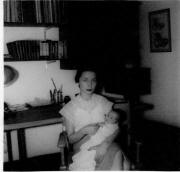
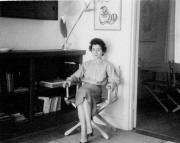
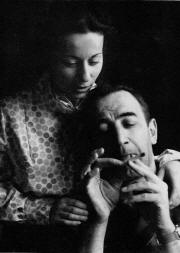
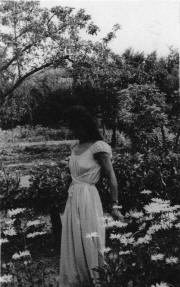
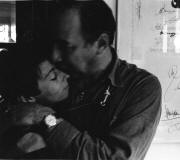

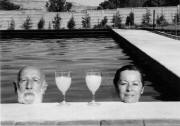
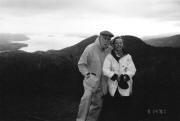
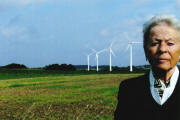
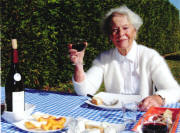
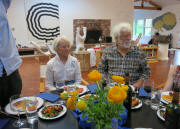
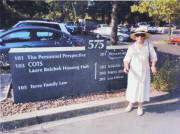

![]()
![]()

![]()
Larousse Accident Compost Pit Slap Sotton Old Woman Solange
Bigoudi GGauthier Twins Pen Infanticide
Conversation Unclear Casino Threshold Michel Bombay
About Laure Acknowledgements Autrefois Go-top
![]()
![]()

![]()
Acknowledgements
Petaluma Ca. USA 2018
These stories were originally written and edited by Laure Reichek long hand -cursive, using a ball point pen.
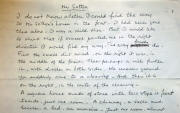
In 2016
Barbara Crum of Watsonville California spent 4 visits of 3-4 days each
-over the course of the year, in Petaluma with Laure. During that
time Barbara read the stories on the paper they were originally written
and edited by Laure. After reading each story, Barbara did a preliminary
transcription using a laptop computer and printed the results to
hardcopy. With the original hand written story and a hardcopy of
the initial transcription, in front of them laid out on the main table
in the main room of Laure's home, Barbara and Laure went over the
stories sentence by sentence and word by word, which resulted in another
hardcopy of the story to continue to compare and conform to the original
handwritten work. This was repeated 3-4 times for each story.
During this year
long collaboration, Laure would occasional read aloud to Barbara an
entire story or a few paragraphs at a time, to confirm the flow and
rhythm of the story. In 2017 Elizabeth Baker went through the editorial
and computer work Barbara had done the previous year. Over a period of
several weeks, Elizabeth focused on typos and grammatical
errors,
further refining the transcribed work.

Larousse Accident Compost Pit Slap Sotton Old Woman Solange
Bigoudi GGauthier Twins Pen Infanticide
Conversation Unclear Casino Threshold Michel Bombay
About Laure Acknowledgements Autrefois Go-top
Autrefois
reprinted from Le Berry D'Autrefois by Jean-Louis Boncoeur
Editions Horvath 21 November 1980
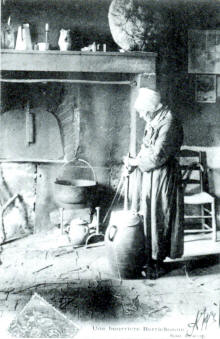
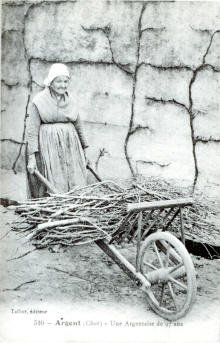
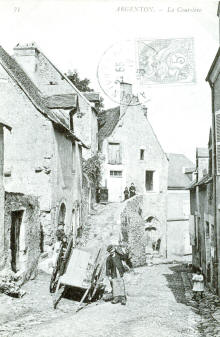
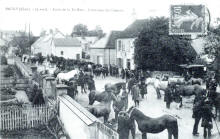
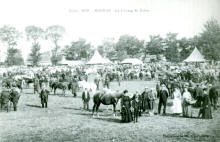
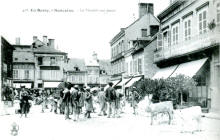
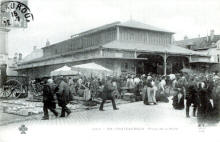
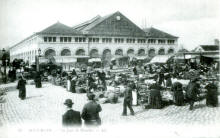
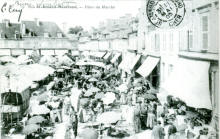
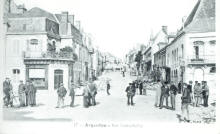
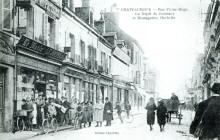
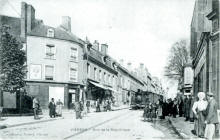
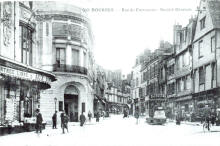
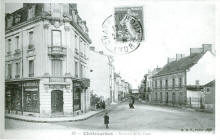
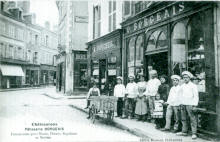
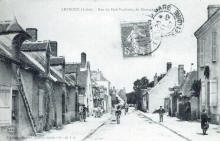
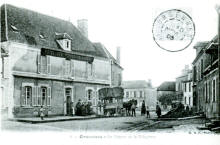
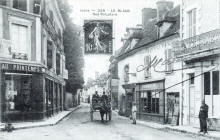
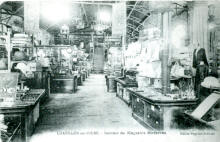
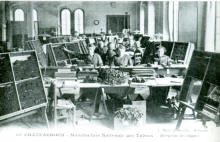
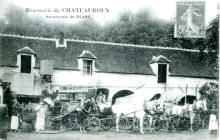
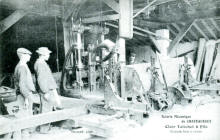
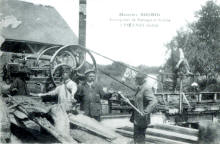
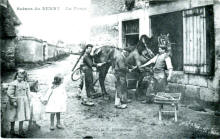
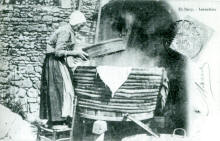
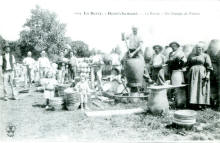
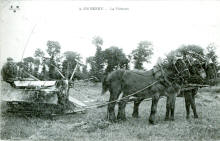
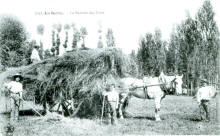
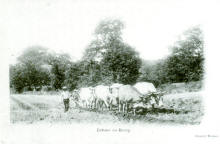
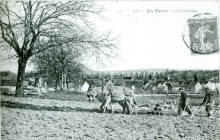
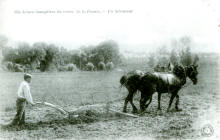
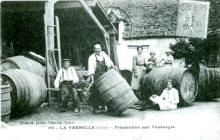
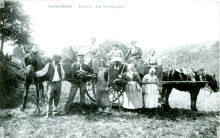
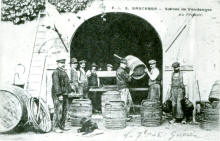
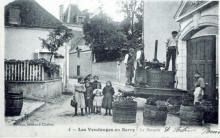
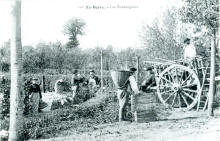
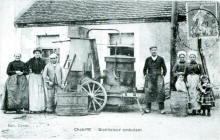

Bigoudi GGauthier Twins Pen Infanticide
Conversation Unclear Casino Threshold Michel Bombay
About Laure Acknowledgements Autrefois Go-top
